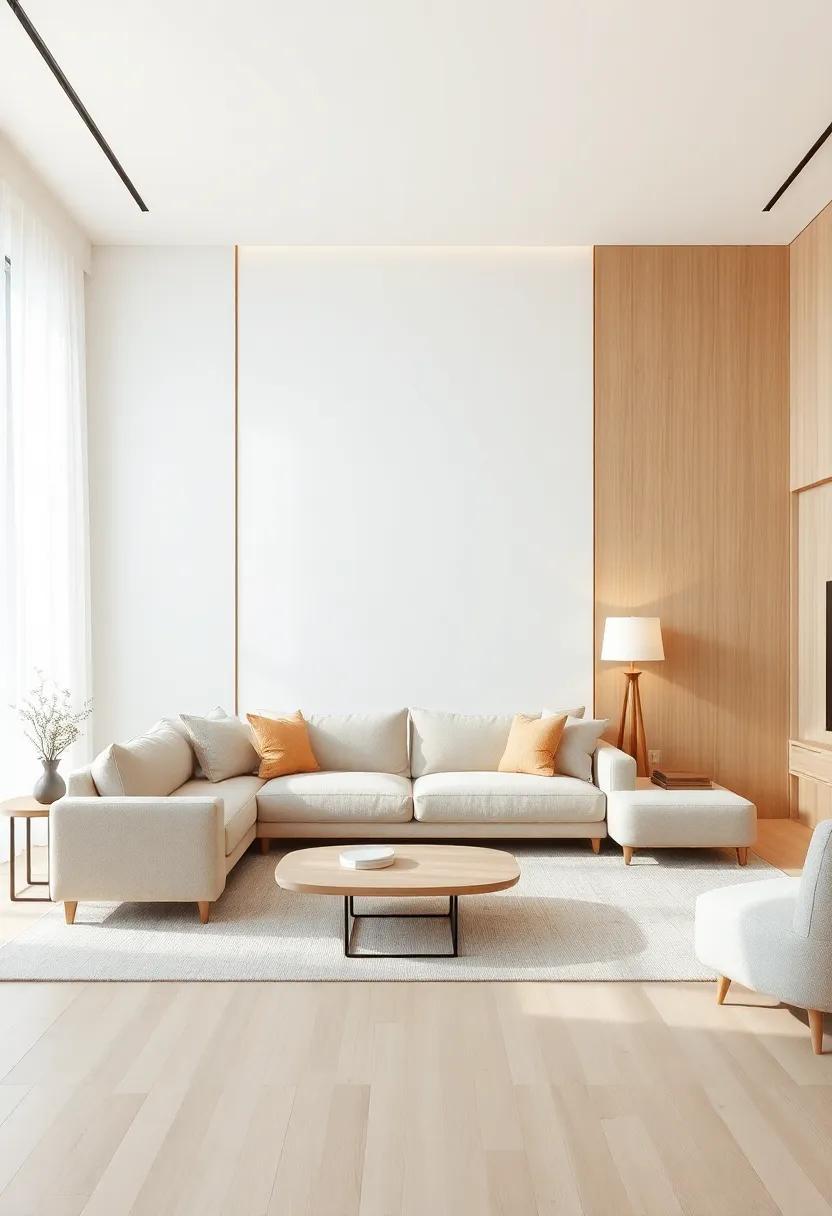The living room is often considered the heart of the home,a sanctuary for relaxation and social gatherings. if you’re looking to infuse your space with serenity and sophistication, Japanese-inspired wooden paneling might just be your answer. This design element not only adds warmth and texture but also evokes a sense of tranquility synonymous with customary Japanese aesthetics. In this listicle, we’ve curated 27 inspiring ideas that embrace the beauty of wooden paneling while marrying it with contemporary living room styles. From minimalist designs that emphasize clean lines to more ornate arrangements that celebrate natural grains, each entry offers unique insights and practical tips. whether you’re planning a complete overhaul or simply seeking to refresh your decor, you’ll find plenty of inspiration to create a serene and inviting atmosphere in your living room. Dive in and discover how wooden paneling can transform your space into a harmonious retreat!
Embrace Minimalism: Opt for clean lines and a subdued color palette to let the wooden paneling shine without distraction
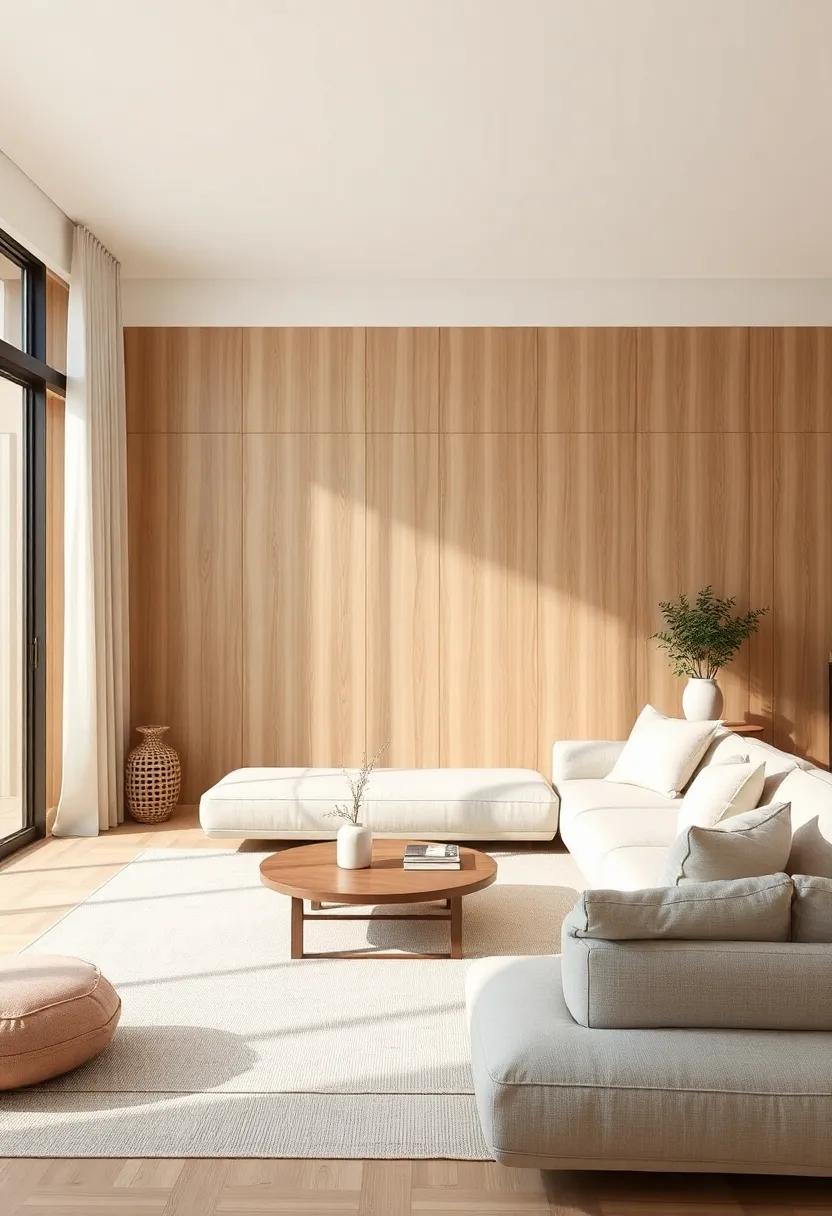
To truly appreciate the elegance of wooden paneling, it’s essential to keep your living space free of visual clutter. Opt for furniture with clean lines that harmonize with the natural aesthetics of wood. Consider items like:
- Low-profile sofas upholstered in muted fabrics
- Simple coffee tables made from raw metals or glass
- Minimalistic shelving units that complement the horizontal forms of the walls
Choosing a subdued color palette enhances the warmth of the wooden surfaces. Shades like soft greys, gentle whites, and earthy beiges serve as a perfect backdrop, allowing the paneling to shine as a centerpiece.Additionally, consider incorporating natural elements to enrich the atmosphere:
- Potted plants with serene green hues
- Textured cushions in earth tones
- Simple artwork that echoes the colors found in nature
Incorporate Shoji Screens: Use sliding shoji screens for versatility, allowing for an open feel while providing privacy when needed
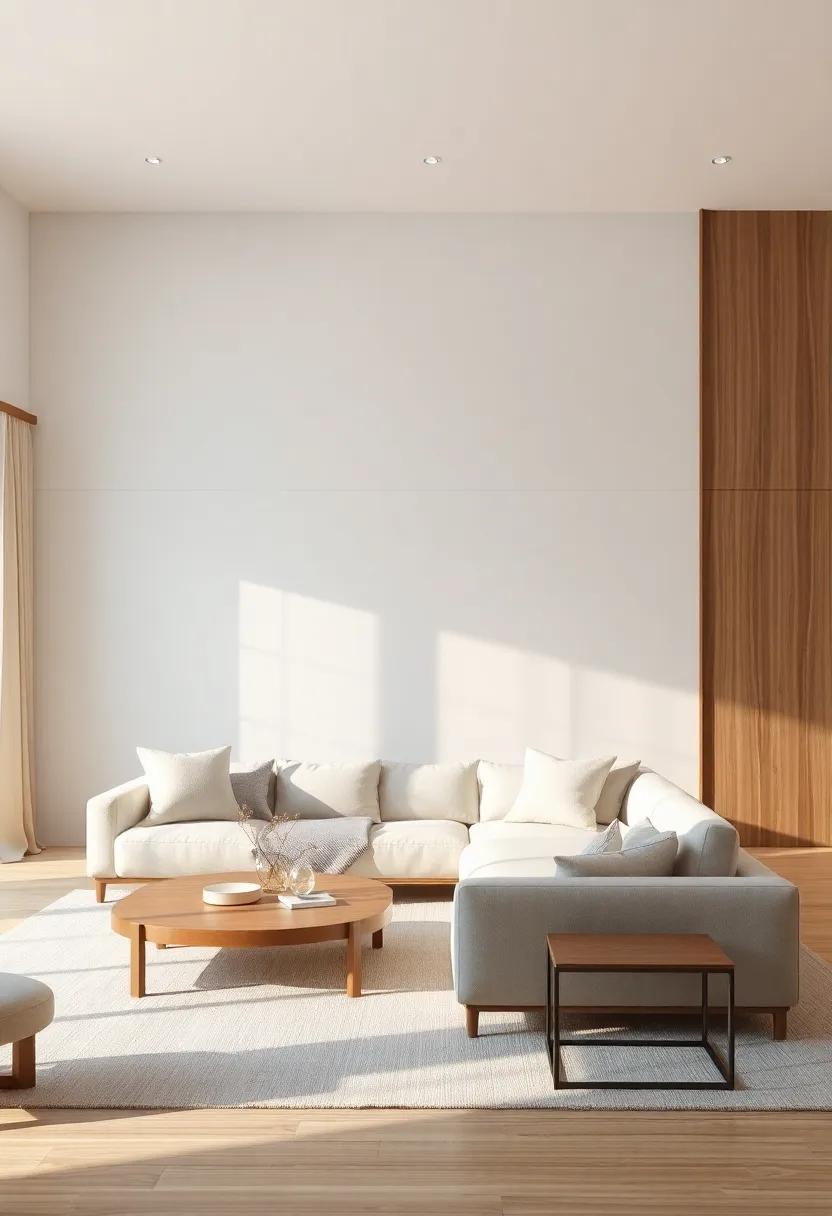
Sliding shoji screens seamlessly blend functionality with elegance, providing a stunning focal point in any living room. These traditional Japanese dividers are not only visually appealing but also incredibly versatile, allowing for easy transitions between open and closed spaces. When combined with natural wooden paneling,shoji screens can enhance the overall aesthetic while offering a peaceful atmosphere. They create a harmonious balance between maintaining an airy openness and ensuring privacy when desired. use them to delineate areas for relaxation, entertainment, or work, adapting your space as needs change throughout the day.
Consider integrating shoji screens into your decor in various creative ways:
- Room Dividers: Create distinct areas without the permanence of walls.
- Window Treatments: Use them to filter light while adding an artistic element.
- Sliding Doors: Replace traditional doors for a unique entrance that blends seamlessly.
- Artistic Backdrops: arrange them strategically to serve as dynamic decor pieces.
- Custom Designs: Opt for personalized patterns that reflect your style while maintaining authenticity.
Fusion of Nature: Introduce indoor plants around the wooden features to enhance a natural, calming atmosphere
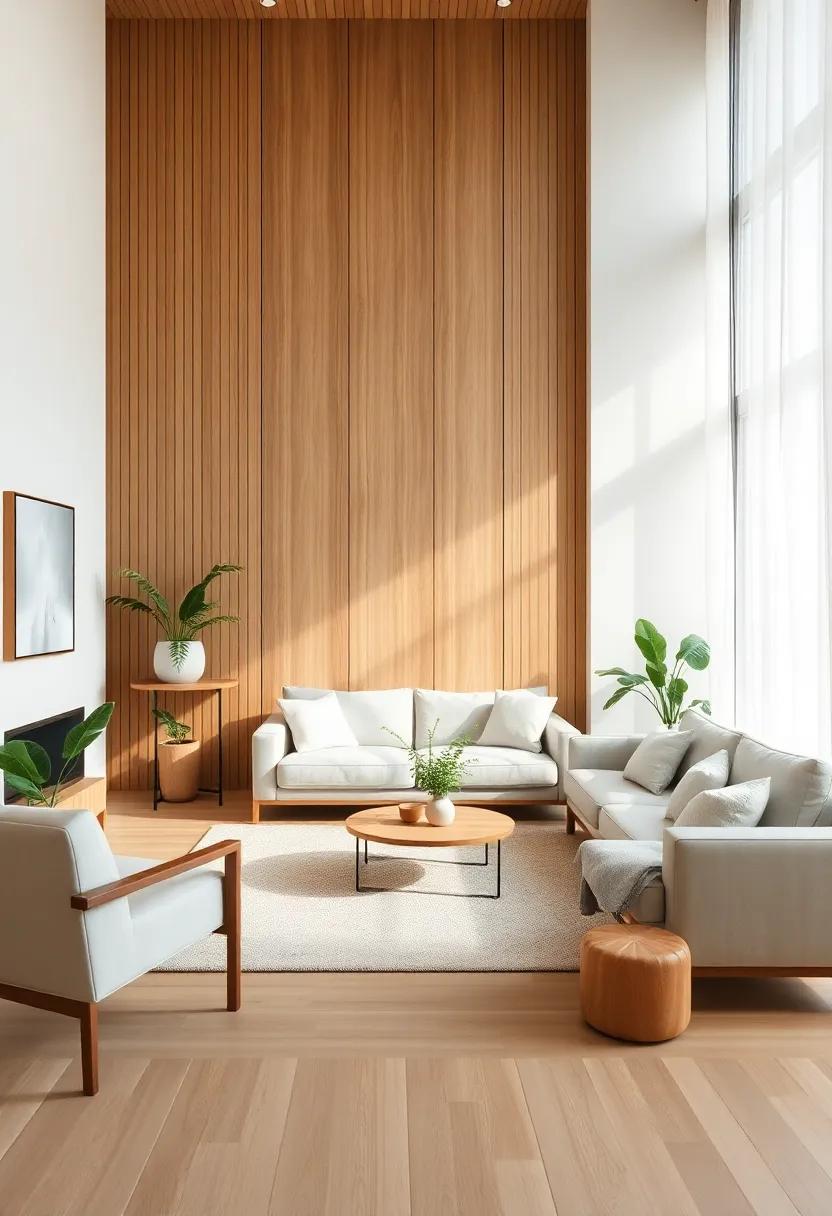
The combination of wooden elements with greenery can create a serene, harmonious atmosphere that embodies the essence of Japanese design. Consider placing indoor plants strategically throughout your living space to complement the warmth of wood. Select a variety of foliage that thrives in indirect sunlight, such as:
- Fiddle Leaf Fig: A tall, statement plant that captures attention.
- Peace Lily: low maintenance and known for its gorgeous white flowers.
- Pothos: Its trailing vines add a dynamic element to shelves or hanging planters.
- bamboo Palm: A symbol of peace, its feathery fronds create a calm atmosphere.
- Zen Succulents: perfect for low-light spaces, offering minimal upkeep.
As you arrange your plants, consider using natural materials for pots to integrate seamlessly with the wooden features of your room. Choose from ceramic, bamboo, or natural stone planters for an organic feel. To elevate the look,you might also create a green wall or a small indoor garden on a shelf to keep your plants organized and visually appealing. Here’s a simple layout for plant placement:
| Location | Suggested Plant | Benefits |
|---|---|---|
| next to a Window | Fiddle Leaf Fig | heightens ambiance with its striking silhouette. |
| On Bookshelves | Pothos | Adds a cascading effect and efficient air purification. |
| Corners of the Room | Bamboo Palm | Creates a lush focal point without overwhelming the space. |
| Table Centerpiece | Peace Lily | Brings tranquility with its delicate blooms. |
modern Furniture Pairing: Combine contemporary furniture pieces with traditional wooden paneling for an eclectic yet harmonious look
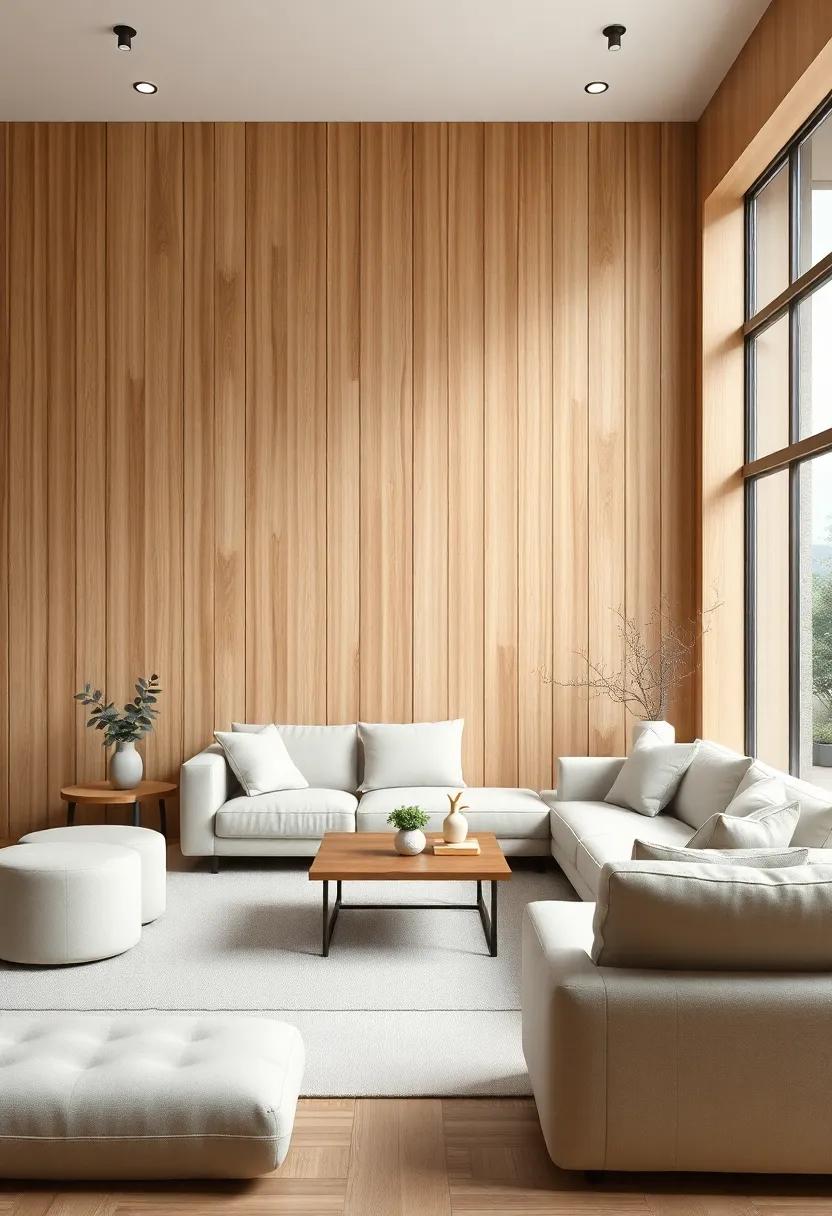
Blending the sleek lines of contemporary furniture with traditional wooden paneling can create a captivating focal point in your living space.Imagine a charcoal grey sectional sofa seamlessly juxtaposed against natural wooden slats that echo the elegance of Japanese craftsmanship. Consider adding clean-lined armchairs in vibrant colors to introduce a playful contrast, while minimalist coffee tables with refined metal bases can further enhance this striking harmony. A carefully curated selection of decor items, such as geometric vases or abstract sculptures, can bridge the gap between the old and the new, ensuring that each piece resonates with the overall aesthetic.
To achieve a balanced look, focus on complementing textures and colors.Incorporate textured throws and patterned cushions on your modern couches, which will provide depth against the wooden backdrop. Use a chic media console that boasts a sleek design to contrast the organic warmth of the wood. To imitate the Zen-like tranquility often found in Japanese interiors, aim for a cohesive color palette; consider a table set featuring a mix of understated hues paired with artisanal ceramics. The key is to maintain a sense of flow between both styles, were each element feels intentional, curated, and cohesive.
Textured Accent Wall: Choose one wall to be the star by adding textured wood paneling with varied finishes and natural striations
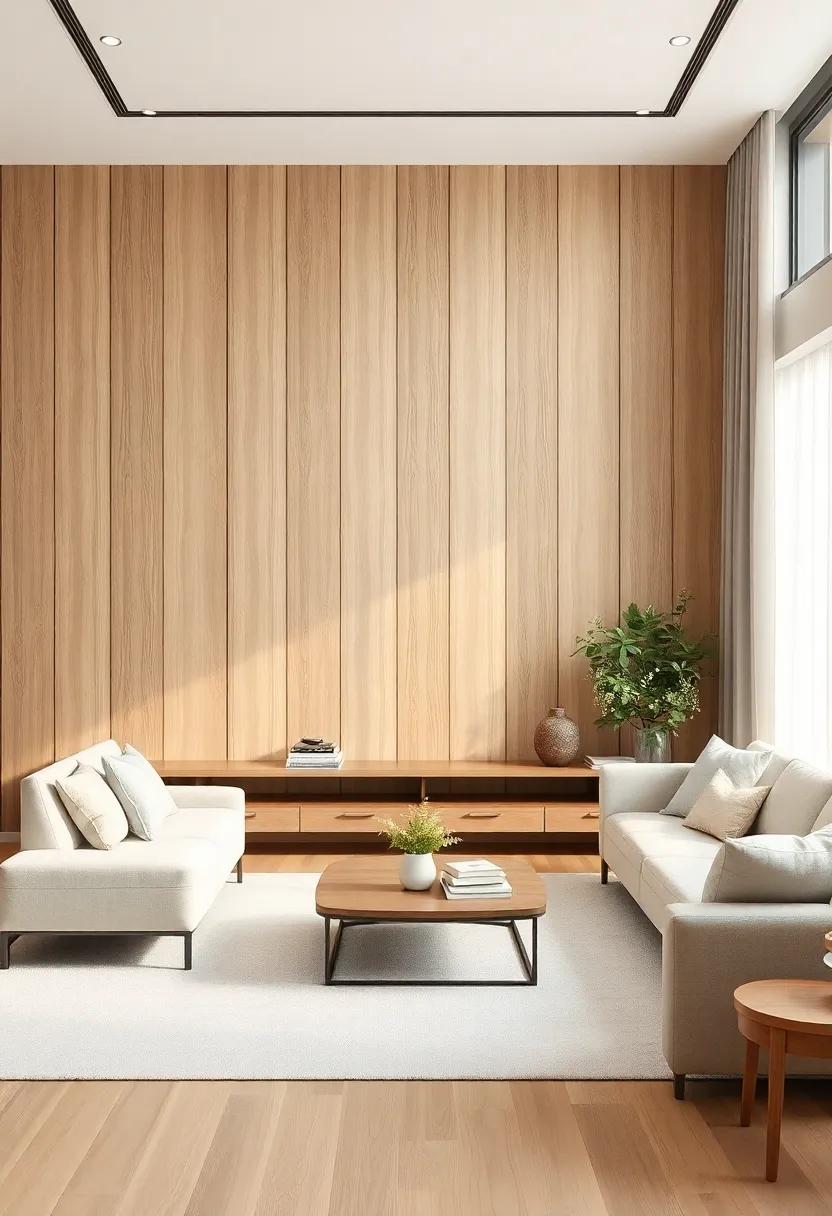
Add a touch of elegance and warmth to your living room by transforming one wall into a captivating focal point.Utilizing textured wood paneling enhances the natural beauty of the materials while introducing a sense of depth and character to the space. Opt for varied finishes to create an eye-catching contrast; think matte against gloss,or a blend of reclaimed wood with sleek,modern panels. this not only adds visual interest but also pays homage to traditional Japanese aesthetics, celebrating simplicity and natural forms.
Consider the following tips when selecting your paneling:
- Color Variations: Incorporate different shades that reflect the hues found in nature—think soft taupes, deep browns, and even charcoal grays.
- Natural Striations: Embrace the unique patterns and grains that wood offers, emphasizing the organic elements of your design.
- Lighting Effects: Use strategic lighting to highlight the textures of the paneling, creating shadows and depth throughout the day.
- Complementing Accessories: Choose furniture and decor items that enhance the paneling without overwhelming it; earthy tones and simple lines work best.
Warm Lighting: Install soft lighting options that highlight the warmth of the wood, creating a cozy ambiance for evenings
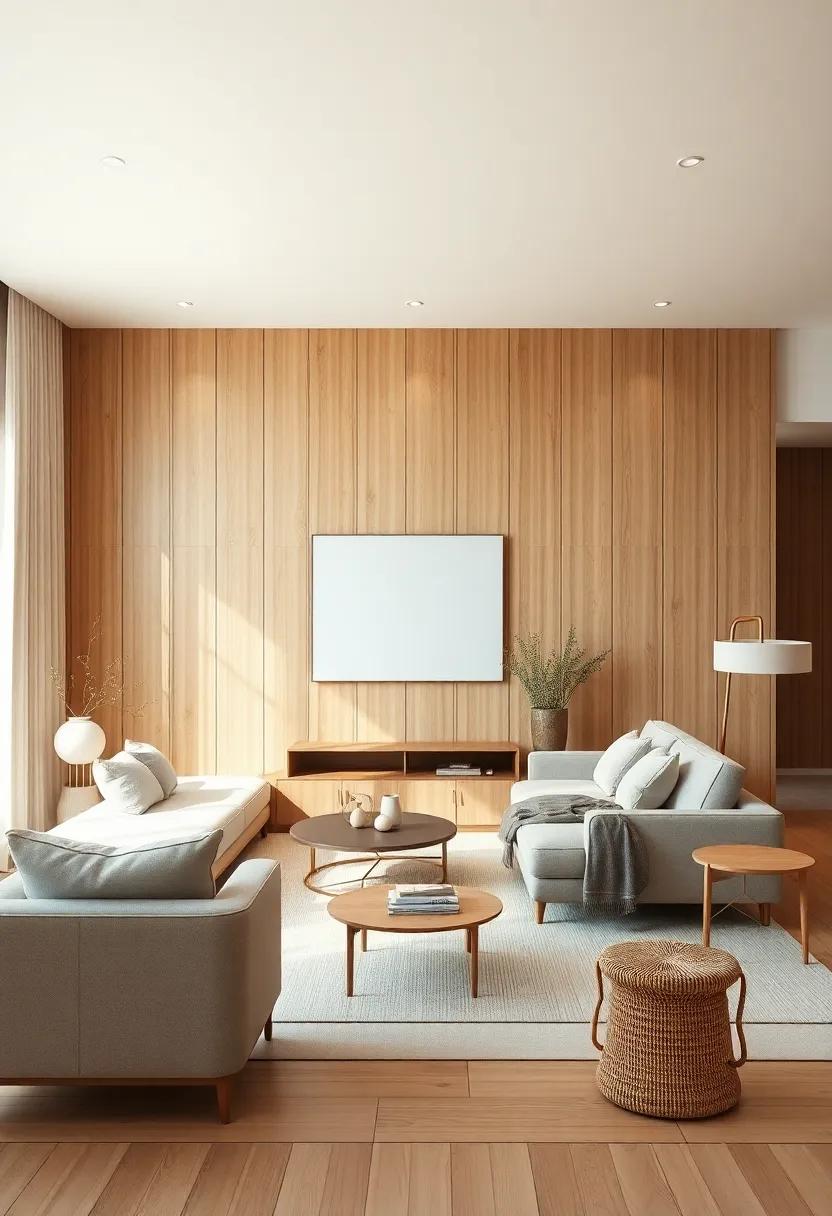
Transform your living space into a serene retreat by selecting soft lighting options that accentuate the natural beauty of the wooden paneling. Warm lighting can create a comforting atmosphere, ideal for relaxing evenings. Consider using recessed lighting down the walls to wash the wood with a gentle glow. You can also incorporate floor lamps with soft, diffused shades or table lamps positioned strategically on side tables to enhance the room’s warm tones.This kind of lighting not only highlights the intricate grain of the wood but also fosters a snug environment for family gatherings or quiet nights in.
To elevate the ambiance further, think about mixing different light sources at various heights, creating visual interest that draws the eye around the space. A chandelier with a warm finish or a pair of pendant lights can act as stunning focal points while providing adequate illumination. additionally, you might want to consider LED strip lights hidden behind shelves or along the baseboards for a seamless glow that enhances the organic feel of the wooden paneling. Remember, achieving the right balance of light temperature is key; look for bulbs labeled as warm white or soft white to maintain that cozy vibe throughout your living room.
Japanese Art Integration: Adorn the walls with Japanese art, such as ukiyo-e prints, to add cultural depth and personality
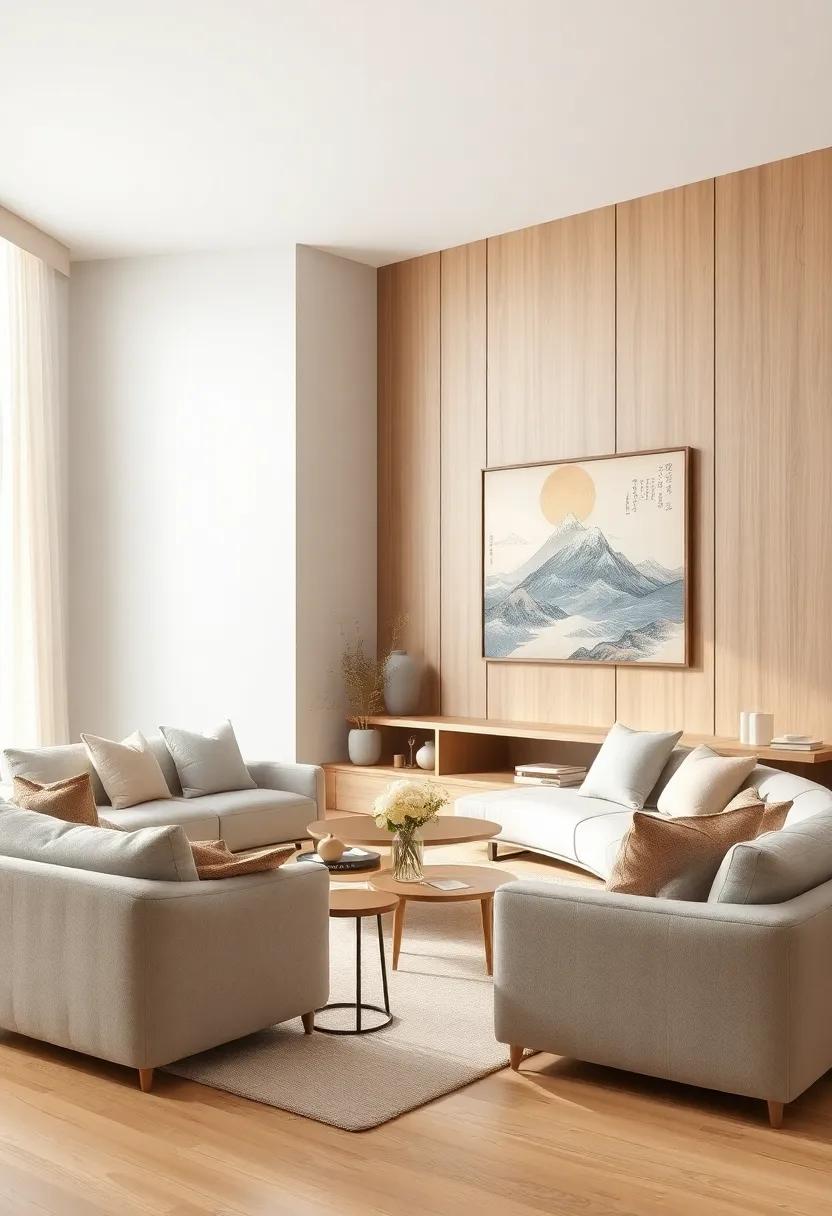
Infusing your living room with Japanese art, especially ukiyo-e prints, introduces a narrative element that complements the soothing aesthetics of wooden paneling. These prints, known for their vibrant colors and intricate designs, capture moments of everyday life in Japan, from breathtaking landscapes to depictions of kabuki actors. By carefully selecting a few key pieces, you can create a gallery wall that not only draws the eye but also serves as a conversation starter. Consider mixing sizes and frames for visual interest, using minimalist frames that allow the art to take center stage, or antique ones for an added touch of history.
To effectively highlight the beauty of your ukiyo-e prints, consider these installation tips:
- Grouping: Arrange prints in clusters of three or five for a cohesive look.
- Lighting: Use spotlights or wall sconces to illuminate the artwork, enhancing colors and details.
- Color Harmony: Choose prints with colors that complement your paneling and overall decor scheme.
To explore different styles of ukiyo-e prints, check out the following table highlighting some popular themes:
| Theme | Description |
|---|---|
| Nature | Captivating landscapes and seasonal changes. |
| Women | Celebrates the beauty and grace of women in society. |
| Theater | Vivid depictions of kabuki actors and performances. |
Embracing these art forms not only enhances your living room aesthetic but also provides a deeper understanding of cultural narratives. Choose frames that resonate with the japanese aesthetic—think simplicity and elegance—to truly let your artwork shine against the backdrop of wooden paneling.
Multi-functional Spaces: Design your living room with multifunctional furniture that blends seamlessly with the paneling to maximize space and utility
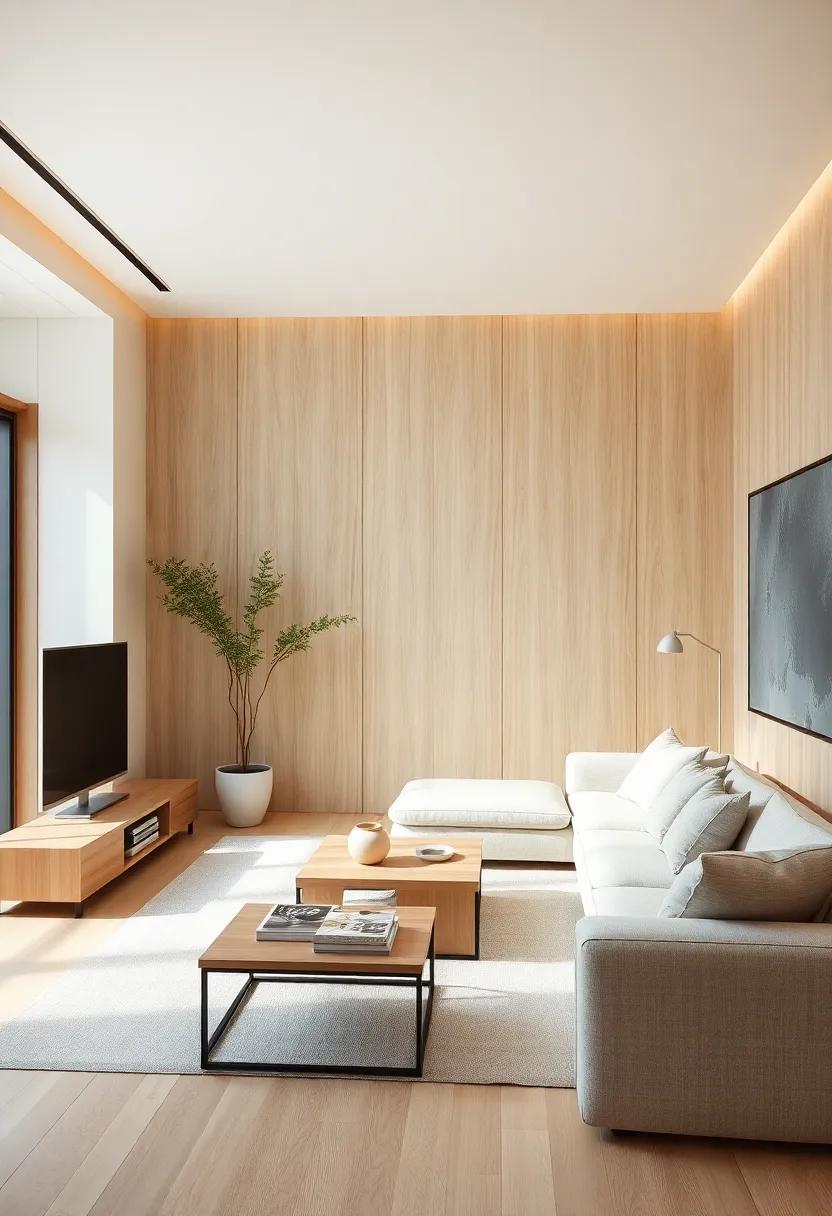
Creating a living room that caters to both aesthetic appeal and functionality is essential in modern design. By incorporating multifunctional furniture,you can harmonize beautifully with Japanese-inspired wooden paneling,ensuring that every piece serves a purpose.For instance, consider a wooden sofa bed that seamlessly blends into the paneling while providing extra sleeping space for guests. Similarly, a coffee table with storage compartments can definitely help keep your living room tidy, doubling as a place to stash remote controls or magazines, all while complementing the natural wood grain of the walls.
Additionally,think about foldable or nesting chairs that can be tucked away when not in use,maintaining an open feel in the space. Decorative ottomans can serve as seating, storage, or even a footrest, offering a versatile option that fits snugly alongside your paneling. You might also explore built-in shelving units that not only display decor but also incorporate hidden drawers for a clean, minimalist look. These carefully selected pieces of furniture will harmonize with the design aesthetic while maximizing utility and space in your living room.
Create balance: Use symmetry in furniture arrangement and decor to balance the visual weight of the wooden panels
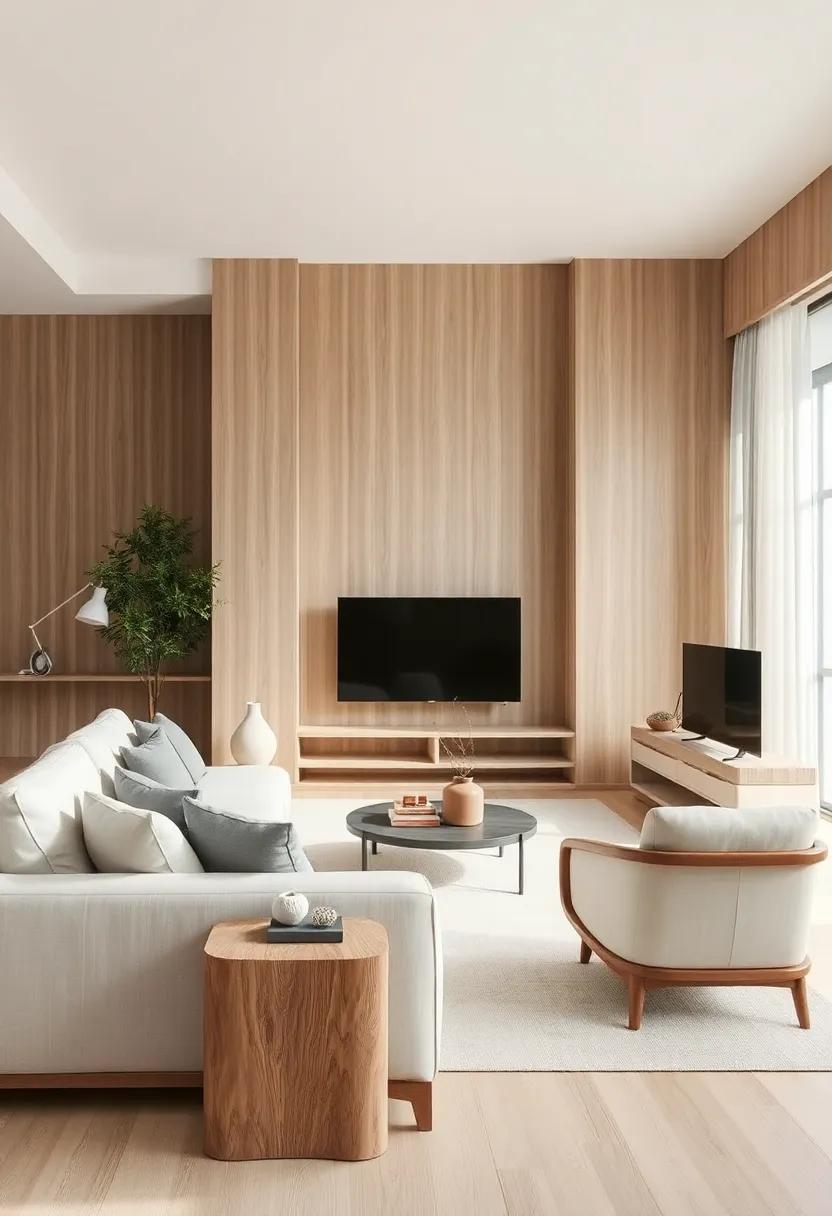
Incorporating symmetry into your furniture arrangement can significantly enhance the aesthetic appeal of a living room adorned with Japanese-inspired wooden paneling. start by positioning your larger furniture pieces in pairs.Place two armchairs directly opposite the sofa, creating a harmonious seating arrangement that facilitates conversation and complements the lines of the wooden panels. Pair this with a sleek, rectangular coffee table at the center to draw the eye and provide a cohesive focal point. Incorporate matching lamps or decorative elements on either end of the furniture arrangement to reinforce the theme of symmetry, ensuring each side mirrors the other while retaining balance with the natural textures of the walls.
When it comes to decor, choose decorative items that mirror one another to enhance the balanced look.Consider using symmetrical wall art such as a diptych or framed prints that echo the wood tones and nature-inspired themes typical in Japanese interiors. For additional visual balance, select a few plants or vases with similar shapes and heights and distribute them evenly across surfaces like shelves or side tables. The key is to maintain a sense of equilibrium, allowing the stunning wooden panels to shine as the backdrop by reducing clutter and creating a serene environment.
Layered Textiles: Use a mix of natural fabrics like linen and cotton to soften the overall look while complementing the wood’s richness
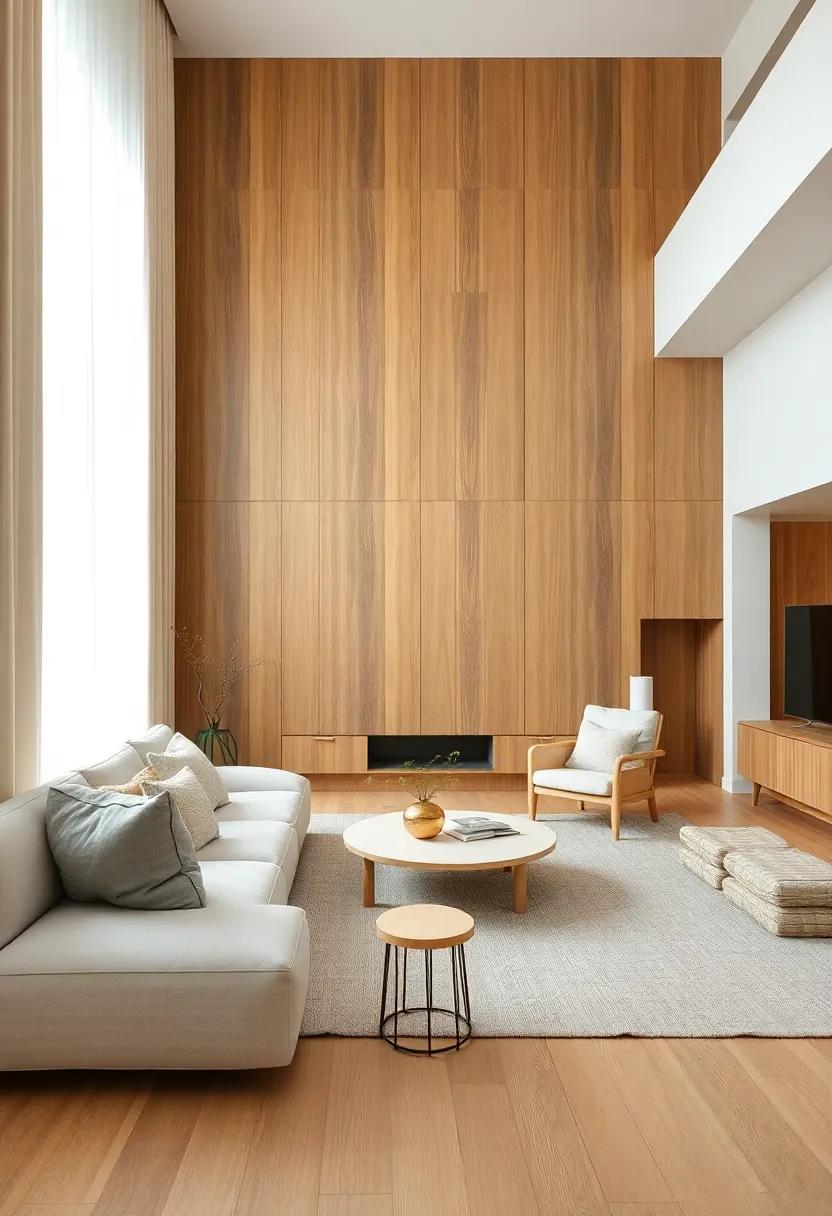
Embracing the beauty of natural fabrics can profoundly enhance your living space, especially when paired with the warm tones of Japanese-inspired wooden paneling. Opt for a mix of linen and cotton to introduce gentle textures that soften the overall aesthetic. Layering textiles not only adds depth but also invites comfort. Consider incorporating these elements:
- Linen throw pillows in muted earth tones to harmonize with wood tones.
- Lightweight cotton drapes that filter sunlight, creating a serene ambiance.
- Woven textile rugs to provide a cozy backdrop without overwhelming the space.
- Textured blankets for a pop of warmth during cooler evenings.
To achieve a cohesive look, coordinate your textiles thoughtfully. Aim for a playlist of colors and textures that speak to the natural world; think soft greens, subtle browns, and creamy whites. Use a mix of patterns—like striped and floral—to maintain visual interest, while aligning them with the elegance of the wood grain.A well-curated selection will not only elevate your space but also ensures a balanced environment:
| Textile | Color Palette | Texture |
|---|---|---|
| Linen pillow Covers | Earth Tones | Soft & Breathable |
| Cotton Curtains | Light Creams | Smooth & Flowing |
| Woven Rugs | Natural Hues | Cozy & Textured |
| Blankets | Muted Pastels | Warm & inviting |
Zen-inspired Decor: Infuse elements of Zen aesthetics, such as stone sculptures and water features, to promote serenity
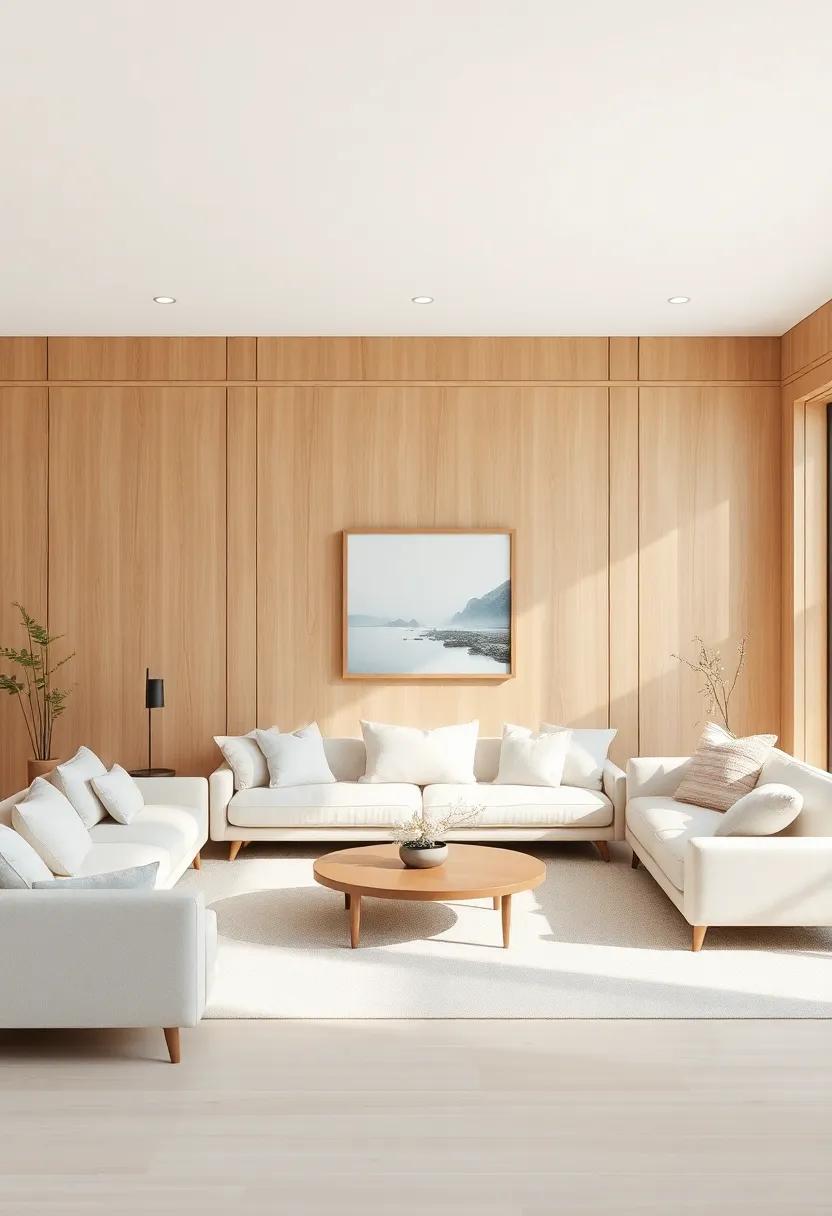
To cultivate a calm and peaceful atmosphere in your living room, consider incorporating Zen-inspired decor elements that resonate with the simplicity and tranquility of Japanese aesthetics. Start by integrating stone sculptures that can serve as focal points, effortlessly blending with wooden paneling. Opt for rocks in various sizes and textures, arranged thoughtfully on shelves or as centerpieces on tables. These natural elements echo the beauty of the outdoors and foster a sense of grounding within your space. Pair these sculptures with bamboo accents, which can be used in furniture or decorative pieces to bring an organic feel that complements the wooden features of your room.
Another essential aspect of Zen decor is the incorporation of water features. this could be as simple as a small tabletop fountain or a more elaborate indoor pond, both of which can enhance the auditory and visual appeal of your living room. The gentle sound of flowing water acts as a soothing background,promoting relaxation and mindfulness. Additionally, you might want to introduce Japanese moss balls (Kokedama) or succulent arrangements in minimalist planters, further integrating nature within the living area. These minimalist touches create harmony and balance,elevating your space into an oasis of serenity.
Transformative Color: Experiment with a contrasting hue on the ceiling to make the wooden walls feel more dynamic and intentional
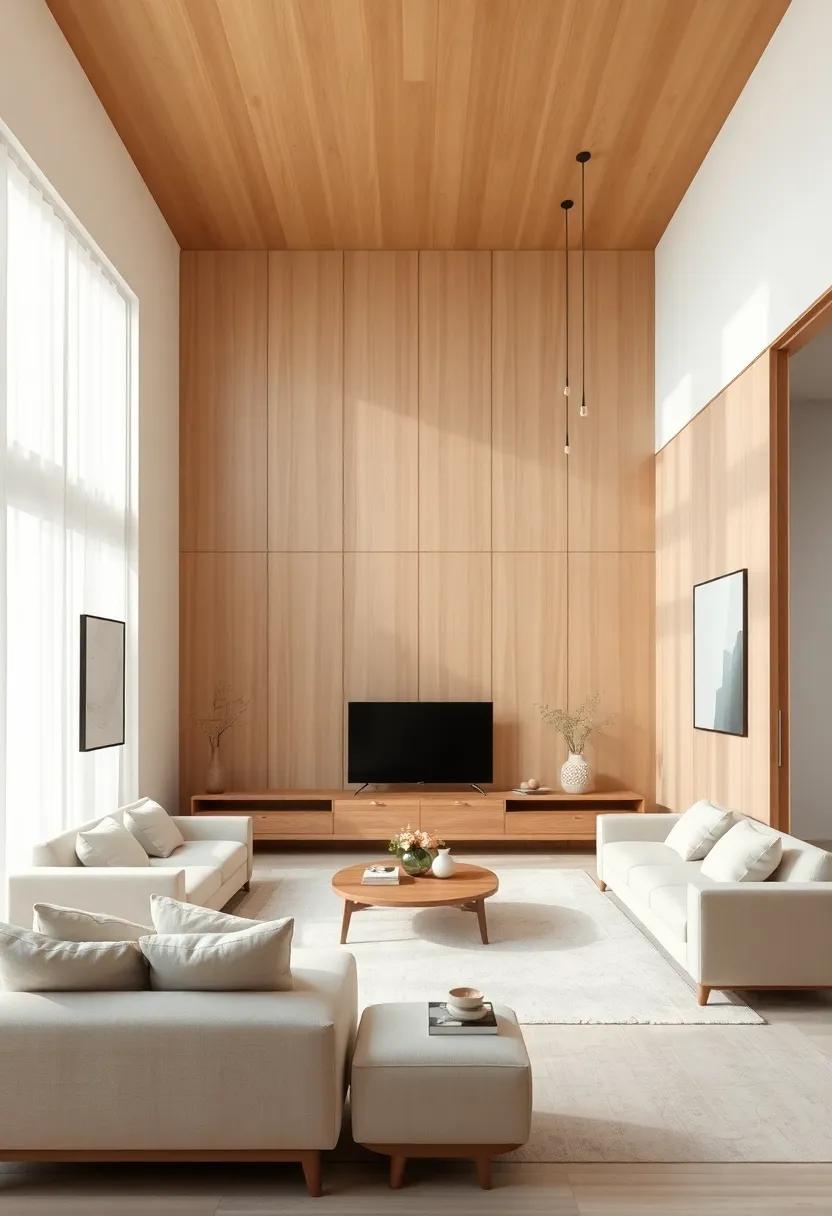
A bold choice in ceiling color can transform your living room into a dynamic space, especially when paired with elegant wooden paneling. Consider applying a rich, contrasting hue such as deep navy or forest green, which not only breaks the monotony of wood but also enhances the warmth of the natural materials. The result is a canopy that draws the eye upward, creating a sense of height and openness, while affirming the richness of the wooden walls. This contrast not only instills a modern feel but also honors traditional Japanese design principles, where the interplay of colors and materials creates harmony and balance.
To further amplify the effect, think about selecting complementary accessories that play off the ceiling color. Incorporate elements like throw pillows, art, or light fixtures in tones that resonate with your ceiling choice—this cohesive integration creates a sense of intentionality. Here are a few suggestions for colors and accessory pairings:
| Ceiling Color | Wood Types | Complementary Accessories |
|---|---|---|
| Navy Blue | Pine, Cedar | Gold accents, warm beige textiles |
| Forest Green | Walnut, Maple | Natural stone decor, earthy tones in rugs |
| Burnt orange | Teak, oak | Muted gray furnishings, terracotta pots |
This creative approach not only revitalizes your living space but also pays homage to the Japanese aesthetic philosophy of combining simplicity and depth, proving that a dash of color can breathe new life into traditional wooden designs.
Rustic elements: Incorporate rustic accents, such as reclaimed wood furniture, which can harmonize beautifully with smooth paneling
Transform your living room into a warm and inviting sanctuary by integrating rustic elements that complement the serene aesthetics of Japanese-inspired wooden paneling. Consider incorporating reclaimed wood furniture that showcases unique grains and textures, offering a tactile contrast to the smooth finish of the paneling. Pieces like vintage side tables,bookshelves,and coffee tables can serve as stunning focal points while bringing character to the space. Highlight the natural beauty of wood by selecting items that retain their ancient charm and showcase imperfections that tell a story.
To enhance the rustic appeal, think about adding subtle decorative accents that harmonize with your furniture choices. Items like handwoven baskets,ceramic vases,or even woolen throws can create a cozy atmosphere that invites relaxation. Consider personal touches, such as a gallery wall featuring framed botanical prints or old photographs, to intertwine rustic nostalgia with modern elegance. Additionally, you might explore the use of neutral palettes and earthy tones in your decor to maintain a tranquil flow throughout the living room, ensuring each piece interacts gracefully with the wooden paneling.
Fire Element: Consider installing a small, modern fireplace that serves as a focal point against the backdrop of the wooden walls
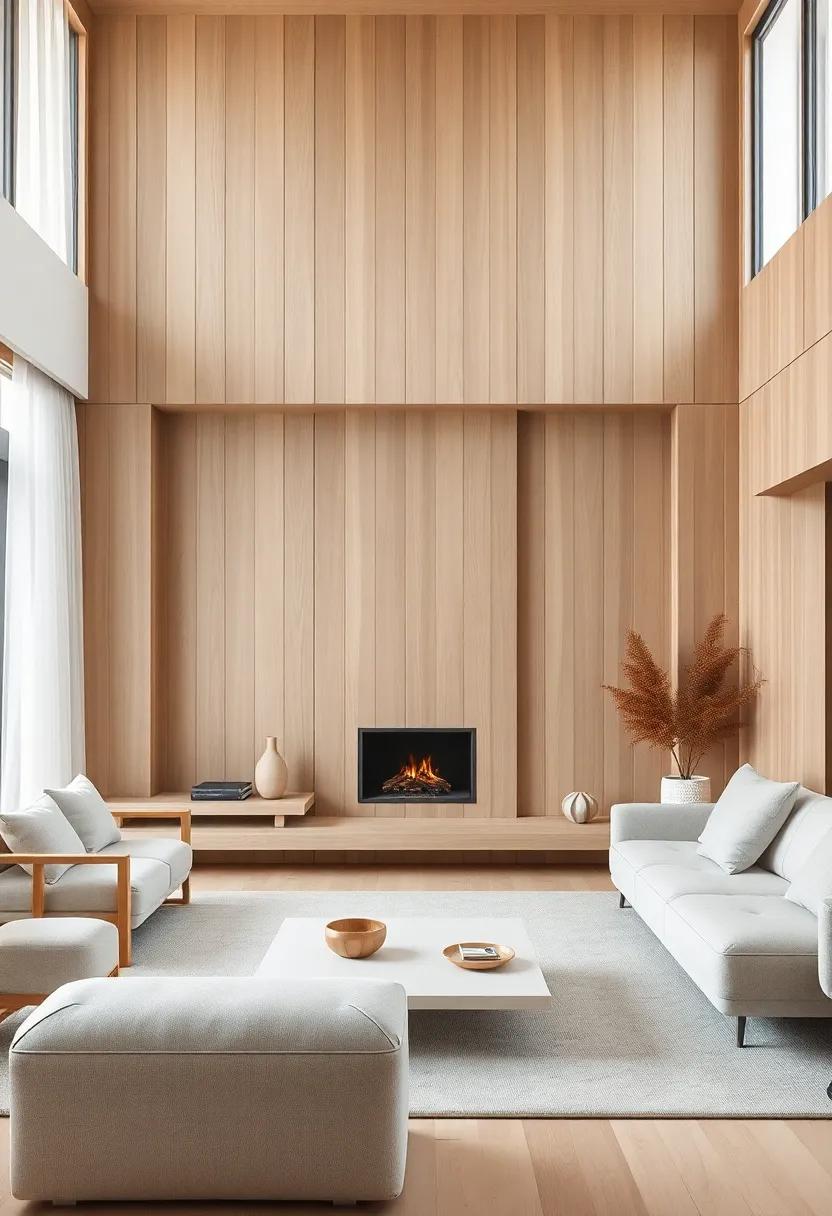
Integrating a fireplace into your living room not only enhances warmth but also introduces a striking visual element against the natural texture of wooden paneling. A small, modern fireplace, particularly one with clean lines and a minimalist design, can merge seamlessly into the decor, offering a contemporary twist to traditional aesthetics. This will create a stunning contrast between the organic warmth of the wood and the sleek, modern surface of the fireplace, making it a captivating focal point within the space.
Consider the following design tips to make your modern fireplace truly stand out:
- Positioning: Center the fireplace against a prominent wall to draw the eye and create a natural gathering spot for conversation.
- material Contrast: Use a combination of materials such as glass, metal, or stone to complement the wooden paneling while adding a bit of elegance.
- Accessorize: add tasteful decor items like candles or minimalist artwork on the mantel to enhance the fireplace’s appeal without overwhelming the space.
- Lighting: Incorporate soft, warm lighting around the fireplace to create an inviting ambiance, especially during the evening hours.
To help visualize these elements, here’s a simple comparison of different fireplace styles you might consider:
| Fireplace Style | Ideal Setting | Pros |
|---|---|---|
| Wall-Mounted | Modern or compact spaces | Space-saving and sleek |
| Freestanding | Open or eclectic layouts | flexible placement options |
| Built-In | Custom-designed living rooms | Seamless integration with decor |
Sliding Door Charm: Add a sliding barn door made of wood to enhance functionality while accentuating the rustic charm
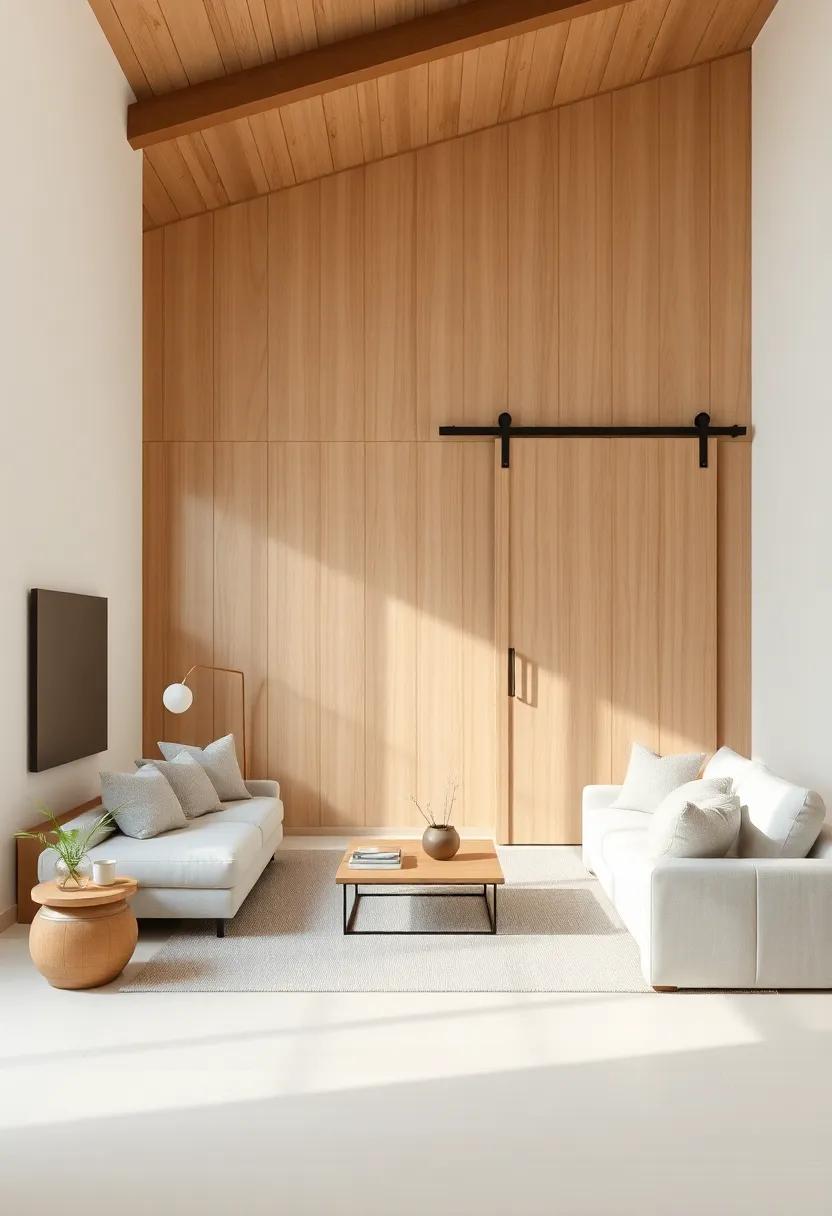
Imagine a cozy corner of your living room transformed by a stunning sliding barn door crafted from rich, natural wood. This functional and aesthetic choice not only provides a practical solution for dividing spaces but also brings an unmistakable rustic charm that complements Japanese-inspired wooden paneling beautifully. The contrast between the sleek lines of the door and the warm texture of the wooden panels creates a harmonious balance, enhancing the overall ambiance of your space.
To maximize the appeal of your sliding barn door, consider these design tips:
- Natural Finishes: Opt for a clear varnish or oil finish that highlights the wood grain, embracing its organic beauty.
- Accents: Incorporate metal hardware in wrought iron or antique brass to add a touch of elegance and an industrial vibe.
- Framing: Frame the door with complementary wood paneling to ensure a seamless transition between different sections of your living area.
Mirrors as Expansions: Use strategically placed mirrors to reflect light and create the illusion of a more spacious living room
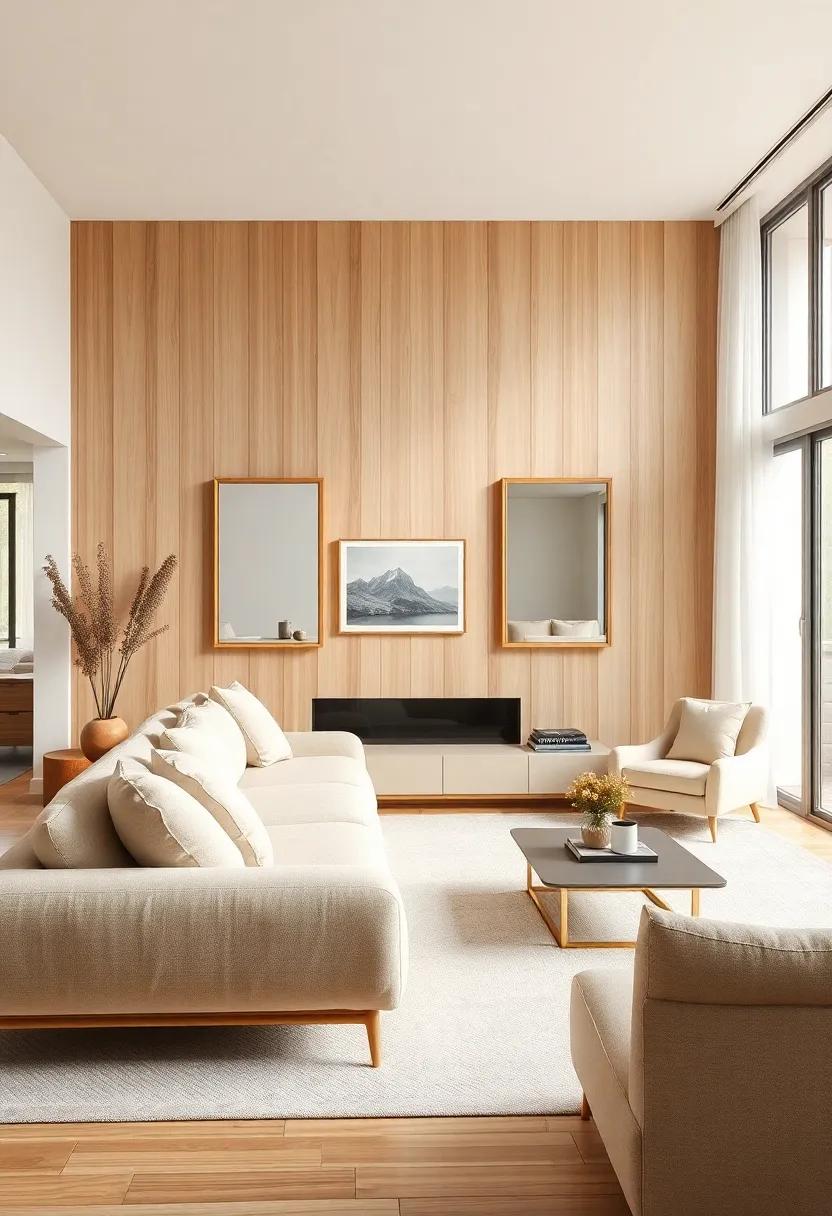
Strategically placed mirrors can serve as remarkable design elements in a living room adorned with Japanese-inspired wooden paneling. By reflecting light, these mirrors not only brighten the space but also create an illusion of depth and expansiveness, enhancing the overall aesthetic while introducing a sense of tranquility. Consider locating mirrors across from windows to capture natural light or against a wall adorned with beautiful wood grains, allowing the combination to amplify visual interest. Here are some key placement tips:
- Opposite Windows: Position mirrors directly across windows to bring in maximum light.
- Layered Reflections: Use mirrors in clusters on a feature wall to create a dynamic look.
- Above Furniture: Place large mirrors above low-profile furniture or mantels to heighten the sense of spaciousness.
- Corner Designs: Consider placing a tall, slender mirror in a corner to elongate the walls visually.
- Statement Pieces: choose decorative mirrors with wooden frames that complement the paneling for cohesive design.
To further enhance the spatial perception in your living room, a carefully selected mirror design can harmonize with the calm and minimalistic ethos that Japanese aesthetics embody. Opting for unobtrusive,minimalist shapes or frames made from natural materials can help maintain a serene ambiance while contributing to the overall decor.Here’s a simple comparison of different mirror types suitable for such interiors:
| Mirror Style | Effect on Space | Suggested Frame material |
|---|---|---|
| Round Mirrors | Softens angles; adds warmth | Wood or bamboo |
| Rectangular Mirrors | Creates a linear focus; enhances ceiling height | Light-stained wood |
| Frameless Mirrors | Maximizes light reflection; less visual clutter | N/A |
Built-in Shelving: Design custom built-in shelves from the same wood as the paneling for a cohesive and tailored look
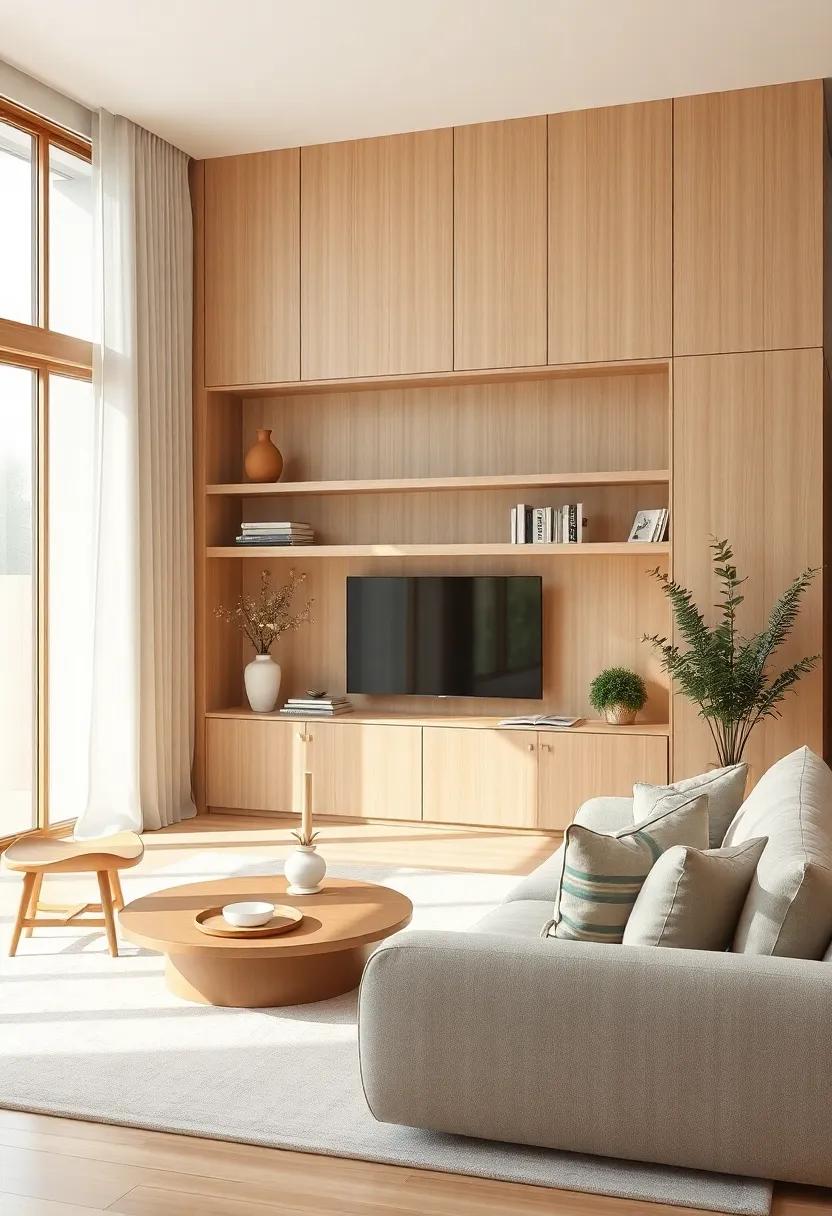
Incorporating built-in shelving into your living room design not only optimizes space but also enhances the overall aesthetic with a touch of sophistication. By choosing to craft these shelves from the same wood as your paneling, you create a seamless flow that draws the eye and adds warmth to the room. consider these elements when planning your custom shelves:
- Material Consistency: Use the same type and finish of wood to ensure a harmonious look with the paneling.
- Design Complexity: Experiment with varying shelf heights to showcase books and decorative items differently.
- Integrated lighting: Incorporate LED strip lighting within the shelves to highlight your favorite pieces.
- Add Functionality: Include closed cabinets or drawers beneath the shelves for hidden storage, maintaining a clutter-free environment.
To further personalize your shelving, consider aligning your design choices with traditional Japanese aesthetics, emphasizing simplicity and natural beauty. Using delicate, intricate joinery instead of visible nails can amplify the craftsmanship. A few additional points to keep in mind are:
- Natural Textures: Choose a wood finish that showcases the grain patterns and textures, enhancing the design.
- Curated Displays: Use your shelves to create curated vignettes that combine decorative elements with functional items.
- Proportion Balance: Ensure that the shelves maintain a visual balance with the walls by sizing them appropriately.
Open-Air Feel: create an outdoor connection with large windows or sliding doors that invite the outside in, bridging the indoor wood with natural landscapes
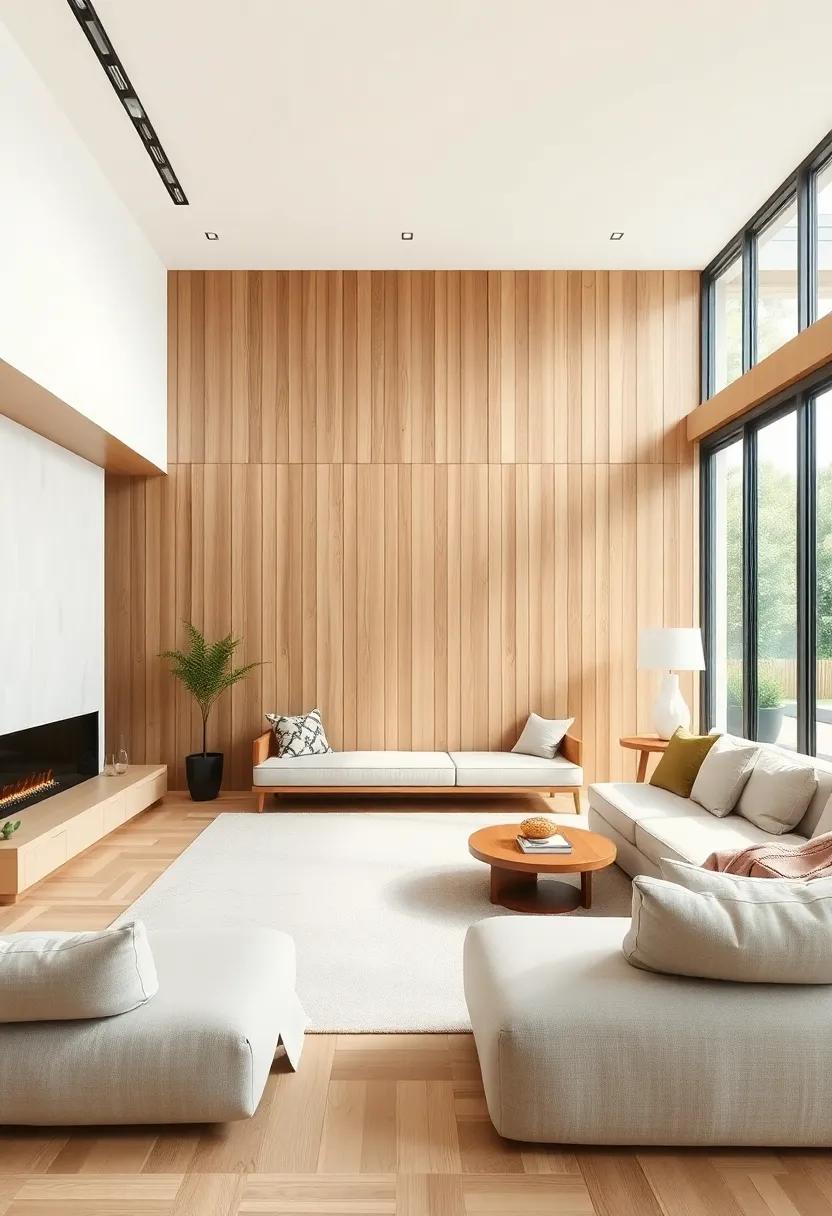
Maximize your connection to nature by incorporating large windows or sliding doors into your living space,creating a seamless transition between the outside world and your serene inner sanctuary. Opt for expansive glass panels that frame captivating views of lush gardens, tranquil water features, or rolling hills. This design choice not only accentuates the beauty of outdoor landscapes but also floods the interior with natural light, making your wooden paneling glow with warmth. The gentle interplay between indoor wood textures and the vibrant hues of nature creates a captivating atmosphere that rejuvenates the spirit and grounds your living room.
To further enhance the open-air feel, consider adding natural elements that mirror the external surroundings. Integrate planters filled with local flora near the windows, allowing the greenery to spill into your living room. Additionally, install sliding doors that blend aesthetically with wooden paneling and provide effortless access to your patio or deck, encouraging outdoor living. This harmonious design approach not only invites the beauty of nature indoors but also fosters a mindfulness connection,turning everyday spaces into tranquil retreats. Whether your style leans toward minimalist or rustic, these features anchor your living room in an organic lifestyle where the indoors and outdoors harmoniously coexist.
Customizable Paneling: Choose paneling that allows for removable sections for added versatility when updating decor or patterns
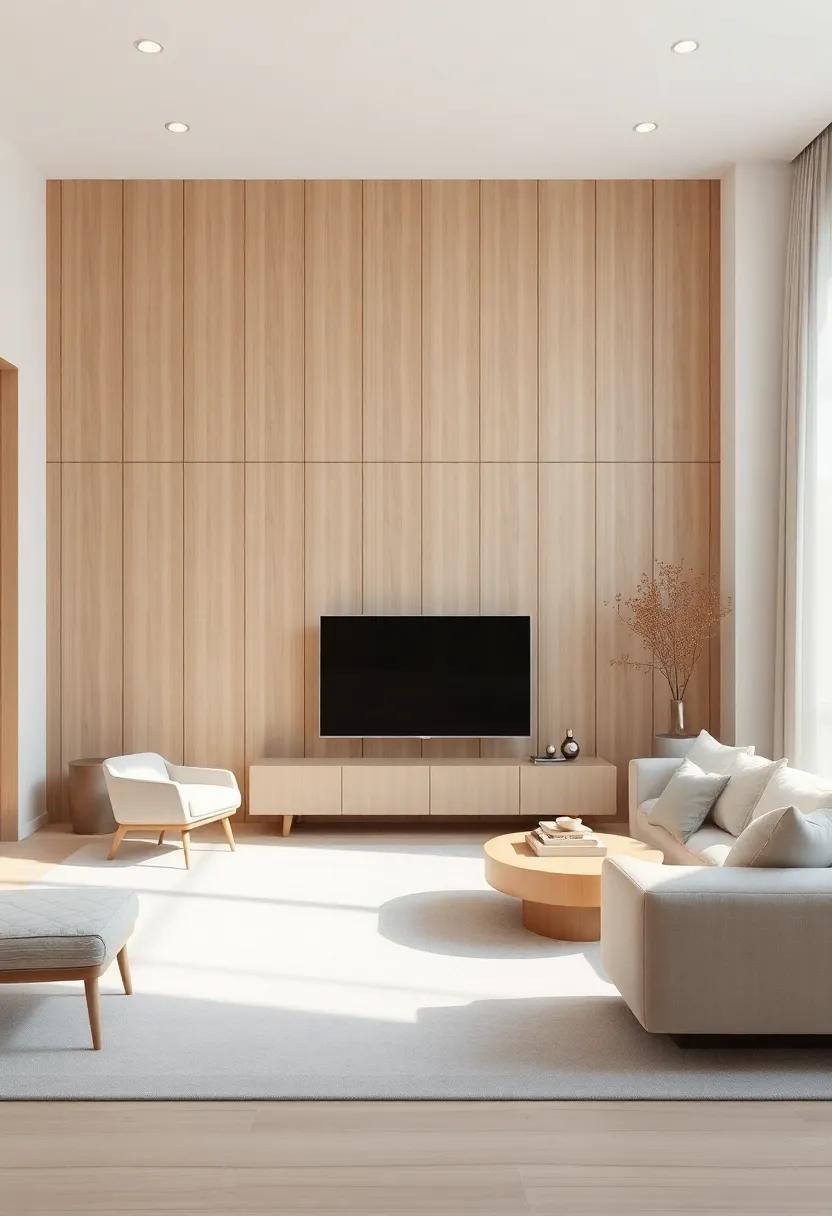
Embrace the beauty of customizable paneling in your living room by selecting designs that allow for removable sections. This innovative approach not only enhances the aesthetic appeal but also gives you the freedom to adapt your space according to seasonal changes, trends, or personal preferences.Imagine easily swapping out panels in different colors or patterns, creating a fresh look that reflects your style. Whether opting for natural wood finishes or painted surfaces, the versatility of removable sections offers limitless options for design exploration.
To maximize the potential of customizable paneling, consider these ideas:
- Interchangeable Inserts: Use panels with slots for various colorful fabric or artwork inserts, allowing you to refresh the look without an entire renovation.
- Modular Shapes: Design your paneling in geometric forms that can be rearranged or exchanged for new shapes,enabling playful creativity.
- Mix and Match Materials: Combine wood with other elements like glass or metal for sections that can be easily interchanged, adding texture and interest to your decor.
Here’s an exmaple of how different themes can shine through customizable paneling:
| Theme | Paneling Design | Color Palette |
|---|---|---|
| Zen Retreat | Natural Bamboo Sections | Earthy Tones |
| Modern Minimalism | Sleek White Panels | monochrome |
| Cozy Cottage | Weathered Wood Inserts | pastel Hues |
Layered Lighting: Employ a combination of floor lamps and pendant lights to create varied layers of light that highlight wooden textures
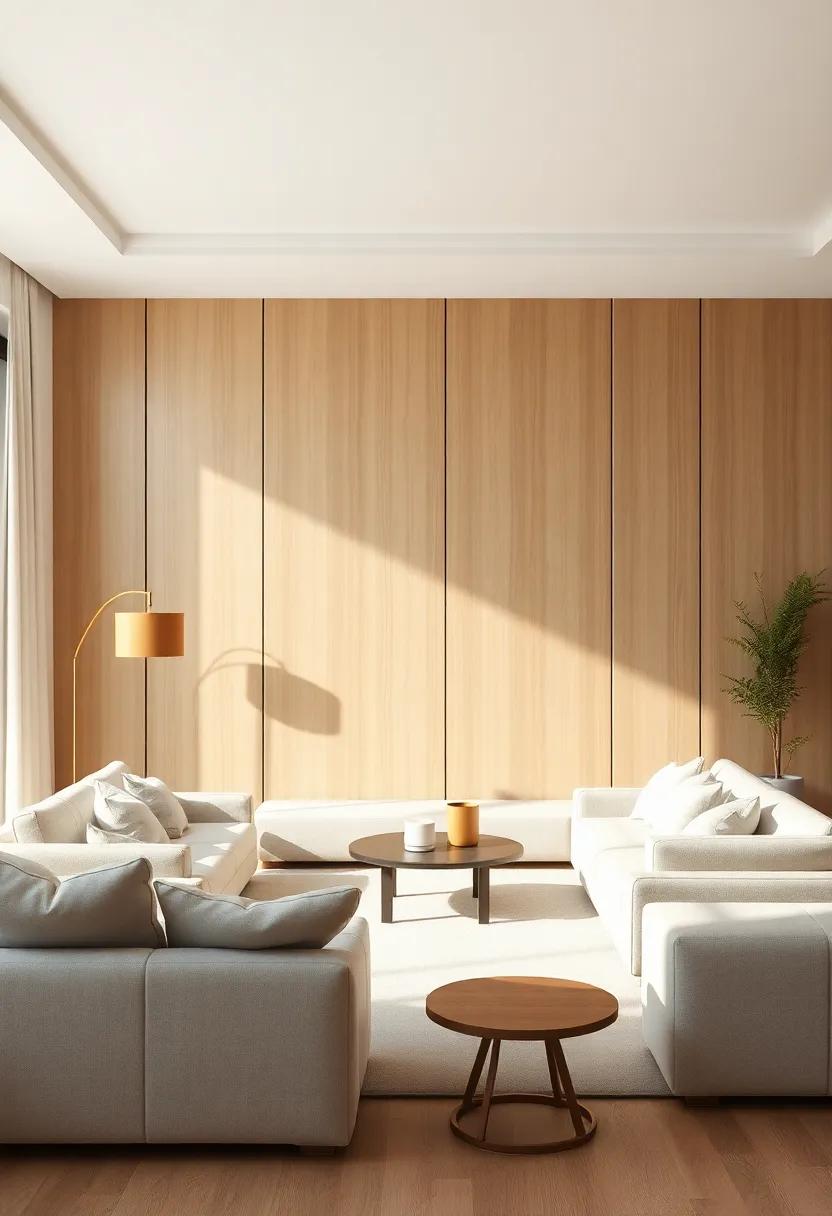
to bring out the warmth and richness of wooden textures in your living room, consider combining floor lamps and pendant lights for a multidimensional lighting approach. The soft glow from strategically placed floor lamps can cast gentle shadows, enhancing the natural grains and colors of the wood paneling. To achieve a harmonious ambiance, choose lamps with warm-toned bulbs and adjust their heights to create varying levels of illumination. For a Japanese-inspired look, select floor lamps with minimalistic designs, perhaps featuring rice paper shades or simple wood bases that complement the paneling.
In addition to floor lamps, complementing them with pendant lights can elevate the overall aesthetic.Position pendant lights at varying heights,such as above a central coffee table or in cozy reading nooks,to draw attention to specific areas while adding elegance. Opt for fixtures with natural materials like woven rattan or bamboo, which echo the organic feel of wood. Together, these layered elements not only provide adequate lighting but also create a serene and inviting atmosphere that celebrates the beauty of your Japanese-inspired decor.
Geometric Shapes: Incorporate geometric patterns within the woodwork for a contemporary twist on traditional design
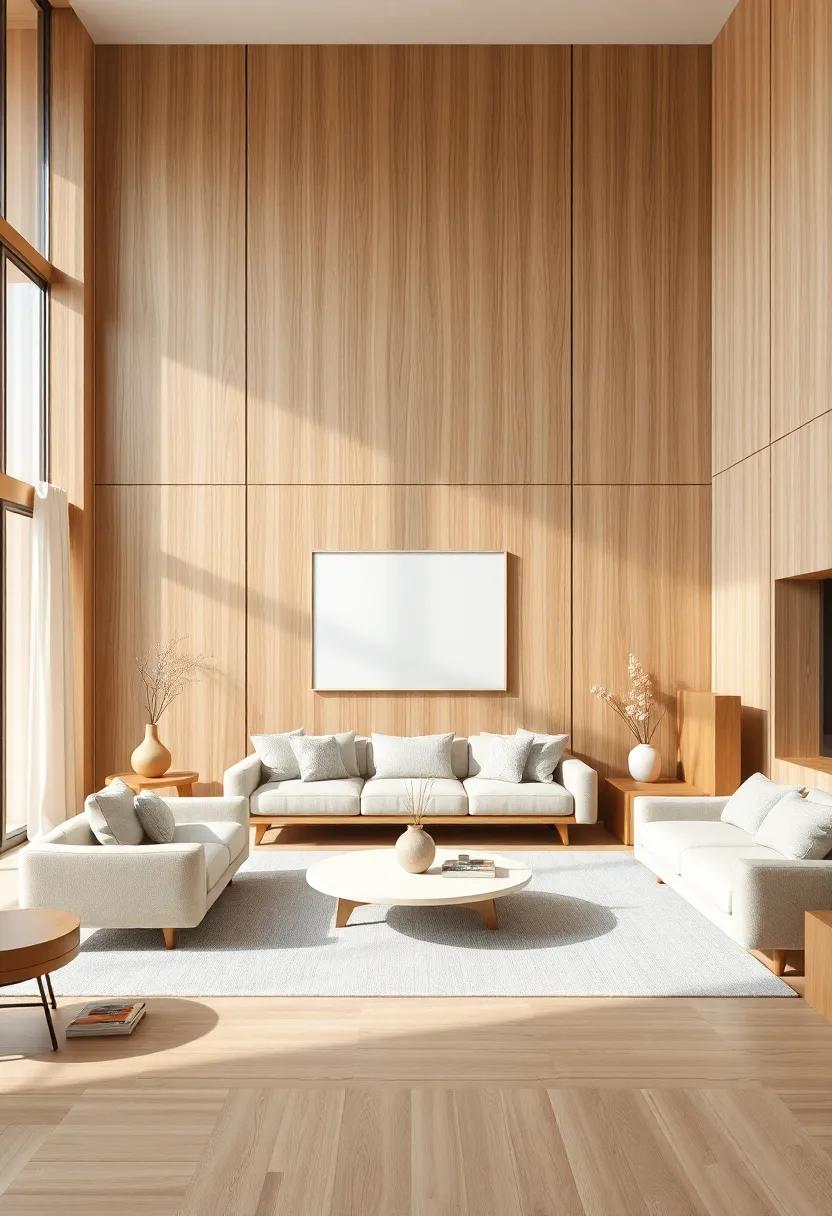
Integrating geometric patterns into the woodwork of your living room adds a striking visual element that breathes life into traditional Japanese-inspired designs. Consider alternating panel widths to create a dynamic rhythm, weaving lines of varying lengths and angles, reminiscent of traditional Japanese architecture. Use motifs such as triangles, hexagons, or organic curves carved into the wood or echoed through the arrangement of panels. This fusion not only enhances the aesthetic appeal but also emphasizes the natural beauty of the wood grain, showcasing the craftsmanship inherent in wooden paneling.
To further embrace this contemporary approach, think about incorporating a color palette that harmonizes with your geometric patterns. Soft earth tones can accentuate the natural warmth of wood, while bolder, contrasting colors can create a striking backdrop. You can utilize geometric inlays in contrasting materials like metal or resin, providing a stunning visual juxtaposition that captivates the eye. By layering these elements, you transform the wooden surfaces into artistic statements, seamlessly blending traditional aesthetics with modern flair, resulting in a living room that is both inviting and visually stimulating.
Seasonal Decor Shifts: Use movable decor elements to change with the seasons, allowing the wooden paneling to remain a constant source of inspiration
Transforming your living room with seasonal decor can be a delightful way to breathe new life into the space while keeping the stunning wooden paneling as your centerpiece. Consider incorporating movable decor elements such as decorative cushions, throws, and wall art that can easily transition from one season to another.For a cozy autumn feel,opt for rich oranges and browns in your soft furnishings,then switch to cool shades of blue and white for a refreshing spring look. Elements like a removable wall hanging or a seasonal centerpiece can effortlessly shift the ambiance without competing with the timeless elegance of the wood.
To further enhance the adaptability of your living room, integrate a few key decor items that can be easily updated. Here are a few suggestions:
- Floral Arrangements: Use seasonal flowers and greenery for vibrant displays.
- table Linens: Swap out table runners or placemats to reflect festive colors.
- Candle Holders: Choose decorative holders that can be filled with seasonal candles.
- Artwork Swap: Change out framed art or prints to echo the mood of the time of year.
This approach allows the wooden paneling to shine through, offering a continuing source of inspiration while the decor around it evolves and reflects the beauty of each season.
Use Natural Finishes: Opt for organic finishes that let the wood grain remain visible and maintain its authentic beauty
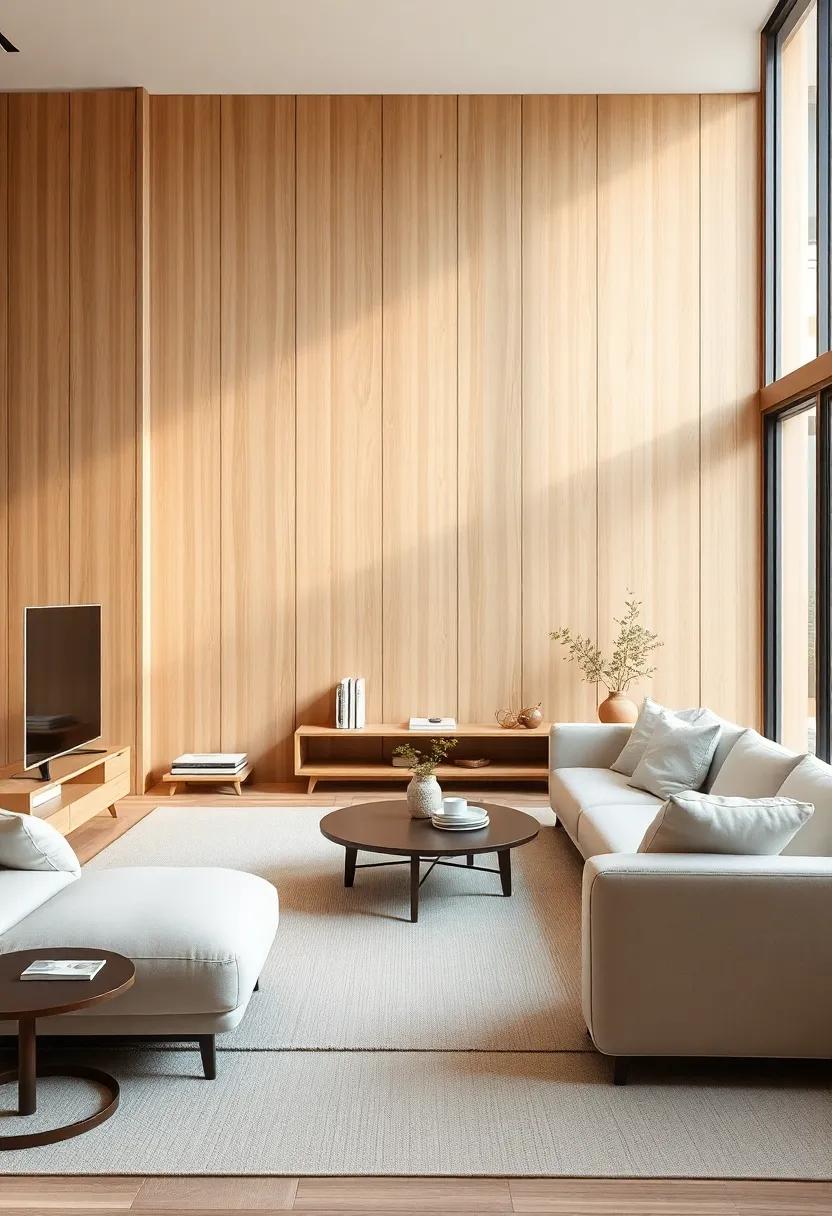
When designing a living room with Japanese-inspired wooden paneling, embracing natural finishes is key to showcasing the inherent charm of the wood. by selecting organic finishes, such as oils, waxes, or water-based varnishes, you can enhance the richness of the wood grain while preserving its authenticity. Unlike synthetic coatings, these natural options allow the texture and warmth of the wood to shine through, creating a tranquil environment that reflects the essence of traditional Japanese aesthetics. Imagine surrounding yourself with walls that tell a story,each knot and swirl a testament to nature’s artistry.
In addition to oil and wax finishes, consider using eco-pleasant stains that accentuate the wood’s natural color without overwhelming it. Select hues that complement the overall palette of your space, ensuring a harmonious blend with decor elements. Here’s a speedy reference for popular natural finish options:
| Finish Type | Key Benefit |
|---|---|
| Linseed Oil | Enhances richness and protects against water damage. |
| Tung Oil | Provides a durable finish with a beautiful sheen. |
| Beeswax | Gives a soft, natural luster and is easy to maintain. |
| Water-Based Varnish | Offers a protective layer without yellowing the wood. |
Utilizing these natural finishes not only elevates the aesthetic of your living room but also contributes to a healthier indoor environment by minimizing the presence of toxic chemicals. Your living space can become a true sanctuary, where the beauty of wood is celebrated in its most genuine form.
Textile Wall Art: hang fabric wall art or tapestries that resonate with earthy tones,enhancing the warmth of the wood
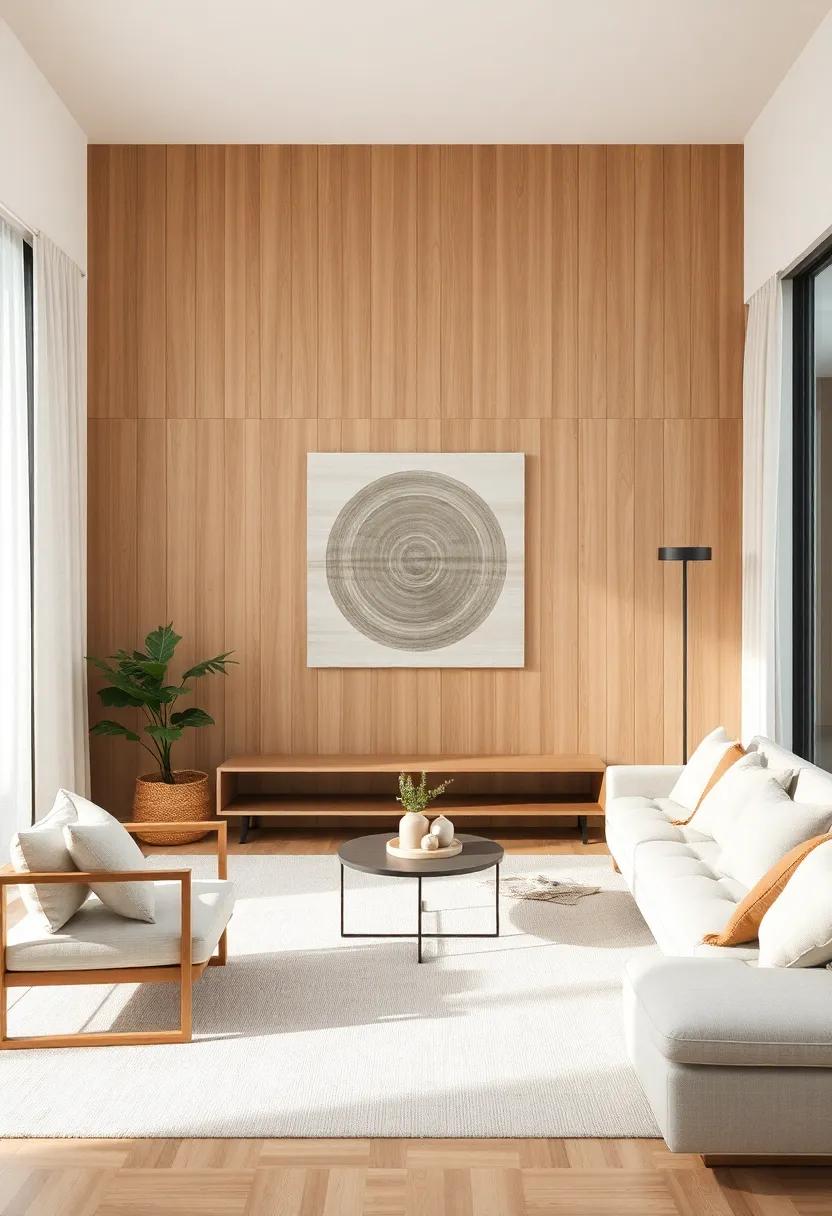
Transform your living space with the timeless elegance of textile wall art, which beautifully complements wooden paneling while infusing the room with warmth. Opt for pieces that draw on earthy tones such as deep browns, rich ochres, and muted greens. These colors not only resonate with nature but also harmonize with the organic feel of wood,creating a serene atmosphere. Consider hanging large, handwoven tapestries or smaller fabric pieces that boast intricate patterns and textures to add depth. The interplay between the soft textile and the solid wood can create a stunning focal point that draws the eye and sparks conversation.
Incorporating textile wall art into your decor allows for endless creativity. Experiment with layering different fabrics to add dimension, or mix various sizes and shapes for visual interest. Try pairing a large, bold tapestry with smaller fabric frames that echo its tones and patterns, ensuring a cohesive look. You can also explore other textile options like quilts or contemporary wall hangings that utilize natural fibers. Don’t hesitate to incorporate pieces from different cultures, as they can add unique narratives and artistic flair to your Japanese-inspired living room ambiance.
Statement Area Rugs: Place a statement area rug that complements the paneling to define spaces within the living room
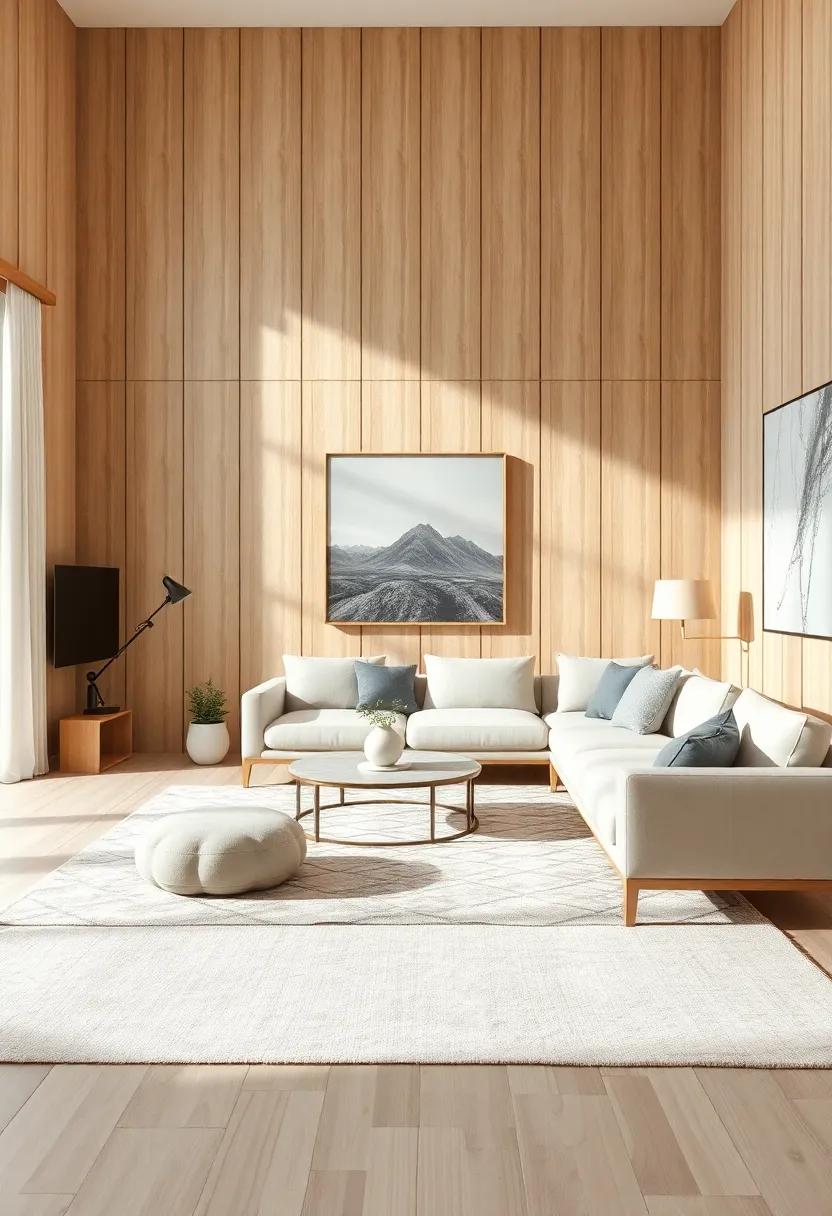
Incorporating a statement area rug is an excellent way to create distinct zones within a living room adorned with Japanese-inspired wooden paneling. A well-chosen rug can enhance the aesthetics of the space while providing comfort and visual interest. Consider selecting rugs with designs that echo the natural textures and colors of wood, such as rich earthy tones or subtle patterns inspired by traditional Japanese art. As an example,a deep indigo rug can beautifully contrast with light wood paneling,offering a stunning focal point that draws the eye.
When arranging your furniture, think about using rugs to delineate different activities within the room, such as a reading corner or a low coffee table area. Here are some rug styles to consider:
- Shag rugs: Their plush texture creates a cozy atmosphere, perfect for relaxed seating zones.
- Geometric patterns: These can add a contemporary flair while still complementing the natural motifs of the paneling.
- Muted tones: Rugs in soft, muted colors can create a harmonious balance that allows the paneling to shine.
- Natural fiber rugs: Made from materials like jute or sisal, these rugs bring an organic feel that resonates with Japanese design principles.
Emphasize Vertical Lines: Utilize vertical wooden paneling to draw the eye upwards, creating an illusion of greater height in the room
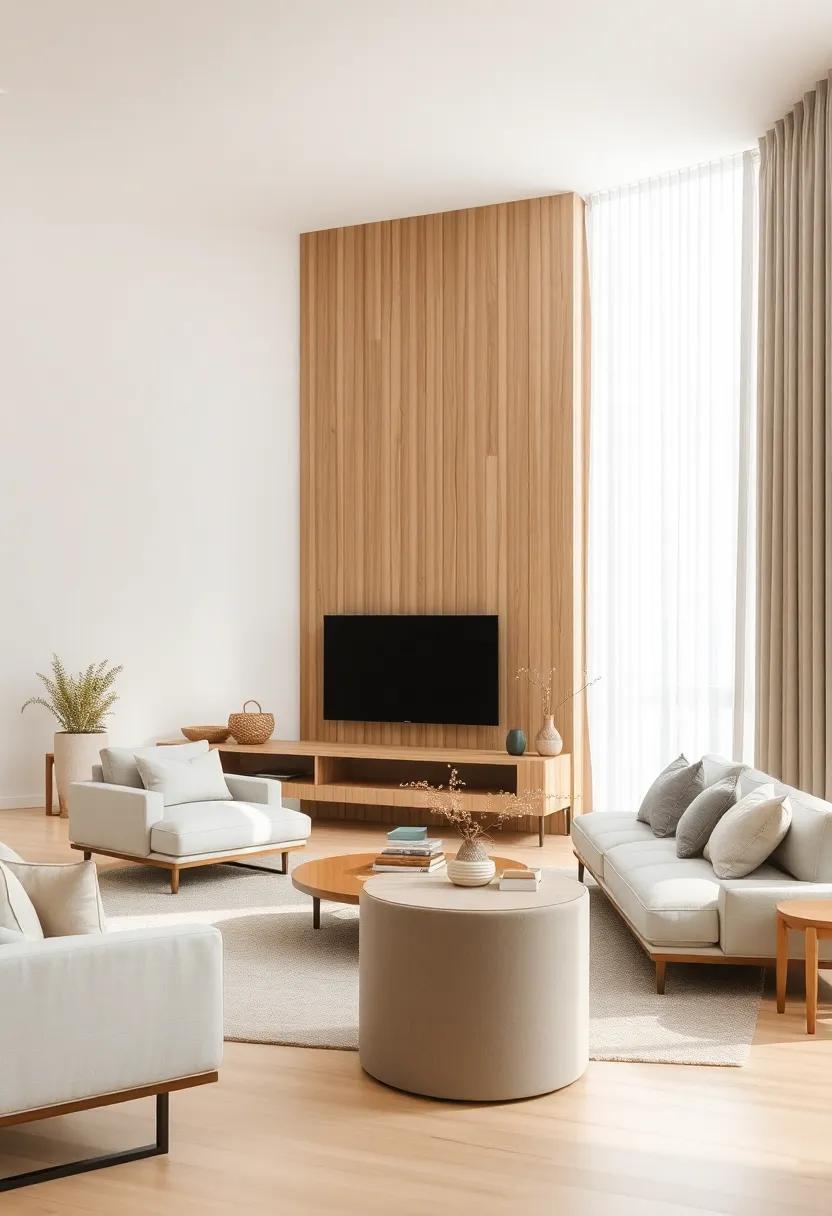
One of the most effective ways to amplify a living room’s sense of space is by incorporating wooden paneling that runs vertically. This design choice not only draws the eye upward but also creates a feeling of expansive heights, transforming even the coziest of rooms into airy sanctuaries. Consider using dark-stained wood or light-finished panels to experiment with different light reflections and moods. The rich textures of the wood will provide warmth, while the vertical lines infuse the space with an elegant sophistication.
To further enhance this design concept, think about pairing the vertical paneling with complementary décor elements. You might opt for:
- Minimalist Furniture: Choose low-profile furniture to keep the focus on the height of the room.
- Statement Lighting: Install hanging fixtures that complement the vertical lines, drawing the eyes even higher.
- Vertical Artwork: Select tall, narrow paintings or sculptures to maintain the visual flow established by the paneling.
Integrating these elements can create a cohesive look that elevates both the room and your personal style.
Smart Technology Integration: Seamlessly integrate smart home technology into wooden paneling for a modern aesthetic without compromising style
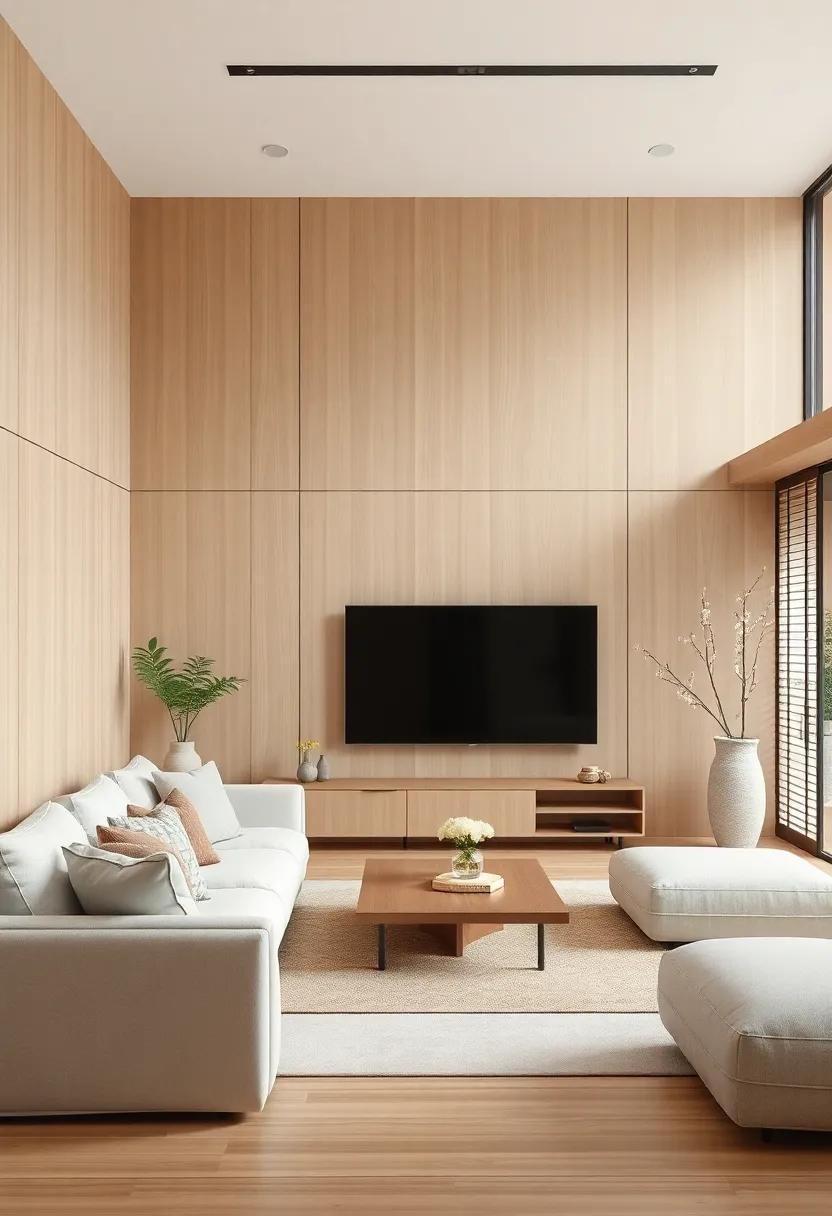
Incorporating smart home technology into wooden paneling can create an elegant, modern twist on traditional Japanese aesthetics. Consider integrating wireless charging pads that can be seamlessly concealed within the paneling, allowing for a sleek appearance without the clutter of visible cables. Smart lighting systems can also be embedded into the panels, enabling customizable mood settings that enhance the tranquil atmosphere of your living room. Use velvet or bamboo-framed control panels that match the wood tones,avoiding the distraction of mismatched devices and providing easy access to smart features.
Another excellent method for achieving this integration is to install smart speakers behind strategically placed wooden slats, ensuring immersive audio experiences while maintaining visual minimalism. You can also use hidden projection screens that slide down from paneling, allowing you to watch movies without sacrificing design. For a complete look, integrate temperature and humidity sensors within the wood, creating a natural harmony between functionality and style.When guests step into your living room, they will appreciate the seamless blend of technology and artistry in the wooden paneling, making the space feel both modern and inviting.
In Summary
As we conclude our exploration of 27 inspiring ideas for incorporating Japanese-inspired wooden paneling into your living room, we hope you’ve found a wealth of inspiration to transform your space into a serene sanctuary. the beauty of this design lies not only in its aesthetic appeal but also in its ability to evoke a sense of tranquility and connection to nature. Whether you choose to adopt a minimalist approach or infuse your room with vibrant touches, the warmth and texture of wood can create a balanced atmosphere that feels both inviting and calming.
Remember, interior design is all about personal expression.Let these ideas serve as a springboard for your creativity, encouraging you to craft a living room that reflects your unique style while embracing the timeless elegance of Japanese-inspired aesthetics. As you embark on this journey, may your living space bloom into a haven of comfort, harmony, and inspiration. Happy designing!
